
Useful Linking Words for Writing Essay in English
By: Author English Study Online
Posted on Last updated: November 15, 2023
Sharing is caring!
Linking words are essential components of any language, and English is no exception. They are words or phrases that help connect ideas and sentences in a coherent and logical manner. In other words, they act as bridges between different parts of a text, making it easier for readers to follow the writer’s train of thought. In this article, we will explore the concept of linking words and their importance in the English language.
Table of Contents
What are Linking Words?
In English, linking words are words or phrases that help connect ideas and sentences when speaking or writing. They are also known as transition words or connecting words. Linking words are used to make communication smoother and more logical when moving from one idea to another.
Using linking words can make your writing more coherent and easier to follow. They help to create a sense of flow and guide the reader through your ideas. Without linking words, your writing can feel disjointed and confusing.
Some common examples of linking words include “however,” “therefore,” “in addition,” “moreover,” “nevertheless,” and “consequently.” These words can be used to show contrast, add information, provide examples, or indicate a cause and effect relationship, among other things.

List of Linking Words
Here is the list of linking words:
- In addition
- Furthermore
- Not only … but also
- Besides this
- In the same way
- In the first stage
- To begin with
- Another reason
- Another advantage
- At this point
- Following this
- A further reason
- In the final stage
- The final reason
Consequence
- As a result
- Consequently
- It follows that
- In that case
- On the other hand
- In spite of
- On the contrary
- Nonetheless
- Even though
- In contrast
- Alternatively
- Undoubtedly
- The reason why
- In other words
- In order to
- Provided that
- Depending on
Types of Linking Words
In this section, we will discuss the three main types of linking words: coordinating conjunctions, subordinating conjunctions, and correlative conjunctions.
Coordinating Conjunctions
Coordinating conjunctions are used to connect two or more items of equal importance. They are also known as FANBOYS, which stands for For, And, Nor, But, Or, Yet, and So.
Here are some examples of coordinating conjunctions in use:
- I want to go to the beach, but it’s raining outside.
- She is studying hard, so she can get into a good university.
- Do you want pizza or pasta for dinner tonight?
Subordinating Conjunctions
Subordinating conjunctions are used to connect a subordinate clause to a main clause. The subordinate clause is less important than the main clause and cannot stand alone as a sentence.
Here are some examples of subordinating conjunctions in use:
- Although it was raining, we decided to go for a walk.
- I will call you when I arrive at the airport.
- Because she was feeling sick, she stayed home from work.
Correlative Conjunctions
Correlative conjunctions are used in pairs to connect two items of equal importance. They are used to show a relationship between two ideas.
Here are some examples of correlative conjunctions in use:
- Either you can come with me, or I will go alone.
- Not only did she finish her work, but she also helped her colleagues.
- Whether you like it or not, you have to attend the meeting.
Linking Words for Addition
When writing in English, it is important to use a variety of linking words to connect your ideas and make your writing flow smoothly. In this section, we will cover some of the most commonly used linking words for addition.
The word “and” is one of the most basic linking words for addition. It is used to connect two ideas that are similar or related. For example:
- We went to the store and bought some groceries.
- The weather was warm and sunny.
“Also” is another common linking word for addition. It is used to add information that is similar or related to what has already been said. For example:
- I enjoy playing basketball. Also, I like to watch it on TV.
- She is a great singer. Also, she plays the guitar very well.
“Moreover” is a more formal linking word for addition. It is used to add information that is not only related but also emphasizes or strengthens the point being made. For example:
- She is not only a great singer but moreover, she is an accomplished songwriter.
- The company not only increased its profits this year but moreover, it also expanded its market share.
Using a variety of linking words for addition can make your writing more interesting and engaging. By connecting your ideas smoothly, you can help your readers follow your train of thought and better understand your message.
Linking Words for Contrast
When we want to show a contrast between two ideas, we can use linking words. These words help to connect two statements that are different from each other. Here are a few common linking words for contrast:
We use “but” when we want to show that two ideas are different or opposite. For example:
- I wanted to go to the beach, but it started raining.
- She’s a great cook, but she doesn’t like to bake.
We use “however” to introduce a contrasting idea. For example:
- The movie was really long. However, it was also really interesting.
- She’s not very tall. However, she’s a great basketball player.
On the Other Hand
We use “on the other hand” to introduce a contrasting idea that is different from the one we just mentioned. For example:
- I don’t like coffee. On the other hand, I love tea.
- He’s not very good at math. On the other hand, he’s a great writer.
Linking Words for Cause and Effect
In English, we use linking words to connect ideas and show the relationship between them. One common type of linking word is for cause and effect. In this section, we will cover some of the most commonly used linking words for cause and effect.
The word “because” is used to show the cause of something. It is often used to explain why something happened. For example, “I couldn’t go to the party because I was feeling sick.” In this sentence, “because” shows the reason why the person couldn’t go to the party.
The word “therefore” is used to show the effect of something. It is often used to indicate a logical conclusion based on the information presented. For example, “I studied hard for the exam, therefore I got a good grade.” In this sentence, “therefore” shows the logical conclusion that the person got a good grade because they studied hard.
The word “consequently” is used to show the result of something. It is often used to indicate a cause and effect relationship between two events. For example, “The weather was bad, consequently the game was cancelled.” In this sentence, “consequently” shows the result of the bad weather, which was the cancellation of the game.
Using Linking Words in Sentences
Linking words are an essential part of English writing and speaking. They help connect ideas and make your sentences flow smoothly. In this section, we will explore how to use linking words in sentences.
In the Beginning of a Sentence
Linking words can be used at the beginning of a sentence to introduce a new idea or to connect it to the previous one. Here are some examples:
- Furthermore , we need to consider the environmental impact of our actions.
- In addition , we should also take into account the economic implications of this decision.
- On the other hand , some people argue that this policy will have negative consequences.
In the Middle of a Sentence
Linking words can also be used in the middle of a sentence to connect two ideas or to add more information. Here are some examples:
- The government needs to invest in renewable energy sources, such as wind and solar power.
- The company is expanding its operations, therefore , it needs to hire more employees.
- The new regulations will affect all businesses, regardless of their size or industry.
At the End of a Sentence
Linking words can also be used at the end of a sentence to summarize or to draw a conclusion. Here are some examples:
- We need to take action to reduce our carbon footprint. Otherwise , we will face dire consequences.
- The company has implemented several cost-cutting measures. As a result , it has been able to increase its profits.
- The research shows that there is a strong correlation between exercise and mental health. In conclusion , we should all make an effort to stay physically active.
In conclusion, linking words are an important tool for any English speaker or writer. They help make your sentences more coherent and easier to understand. By using them correctly, you can improve your communication skills and express your ideas more effectively.
Practice Exercises with Linking Words with answers
We understand that learning linking words can be challenging, but with practice, you can master them. In this section, we have provided practice exercises with answers to help you improve your understanding of linking words.
Fill in the Blanks
Fill in the blanks with the appropriate linking word from the list below:
- She worked hard, __________ she failed the test.
- I love chocolate __________ I know it’s not good for my health.
- He is very intelligent, __________ he lacks common sense.
- She is a great athlete, __________ she is also an excellent student.
- He didn’t study for the exam, __________ he failed.
Matching Exercises
Match the sentences in column A with the appropriate linking word in column B.
Linking Words And Phrases In English (List With Examples)
In this study guide, you will learn how to use linking words in English. You will discover the meaning of common linking words and learn how to use them in a sentence. Examples are provided to show you the sentence position and use of common linking words in English. Check out the exercises at the end to test your understanding!

What are linking words?
- Meanings & uses
- List with examples

What you will learn:
Discourse markers (‘linkers’) are words or phrases that we use to make links between words in a sentence. These discourse markers are used in both spoken and written English.
Here we will focus on discourse markers in writing and formal spoken English – commonly known as ‘linking words’. Linkers are a way of making connections between ideas and sentences.
Formal and informal linkers
Informal linking words are used in spoken English. You can link your ideas with words and phrases like: I mean , honestly , after all , besides and in any case . It is useful to learn which linking words are most appropriate in formal and informal situations. In an email, you might choose linking words such as so , but , and because . These should already be familiar.
In an essay, you are more likely to choose formal linkers, such as therefore , however , consequently, on the contrary and moreover . There are some linking words that are so formal that you may choose not to use them at all in your writing. Examples include: thus , hence and nonetheless .
Linking words and sentence position
Many linking words are used at the beginning of a sentence, while others can be used in the middle or at the end. Words and phrases connected with sequencing and structure appear at the start of a sentence. Examples include: first , secondly , finally and in conclusion . Adverbs, which express the writer’s opinion, also occur at the start of a sentence, for example evidently and obviously .
Linking words can be used between clauses, in the middle of the sentence. Examples include: words that contrast ideas ( however , although), show consequence ( therefore, as a result), and phrases that add more information ( moreover, furthermore) . A few linking words can be placed at the end of the sentence. Look at the following example: Learning a second language is motivating. It can be very difficult, however .
Punctuation
The use of punctuation with some linking words and phrases is important. Some grammar books provide you with specific rules about punctuation and clauses in a sentence. The most important reason for using punctuation in a sentence is so the reader can understand your intended meaning.
Punctuation, particularly commas , should help the reader to identify clauses in your writing and lead to a clearer understanding of the text. Look at these two example sentences – which is easier to understand?
A: To conclude the cars of the future are likely to be more environmentally friendly however this change may take many years to implement and moreover will require the support of the general public.
B: To conclude, the cars of the future are likely to be more environmentally friendly, however, this change may take many years to implement and, moreover, will require the support of the general public.
Linking words are very important in written texts. Without them, your writing may be disconnected and difficult to read. In English examinations, students are often graded on their ability to write cohesive sentences. Therefore, learning how to use linking words correctly is an important skill in learning English as a second language. The examples below will help you to understand the meaning of linking words in written texts and to improve your own linking skills!
Linking words: meanings and uses
Conjunctions are a familiar group of linking words, which join two clauses in a sentence, such as but , because or however. In fact, linking words have many different functions in a sentence and range from single words to phrases of up to four words. The categories below show the most common types of linking words.
Sequencing First, secondly, subsequently, finally
Words like first , second and finally appear at the start of a sentence. They help the reader to navigate their way through the text. They are used in essays but also in instructions, for example recipes.
Adding information In addition, also, furthermore, what is more
These linking words are used to give additional information or to strengthen our argument.
Comparison Similarly, equally, likewise
We use these linking words to add further examples or to make connections between ideas.

Giving examples For example, for instance, e.g., such as
Use these linking words to give examples.
Consequence Consequently, therefore, as a result, hence
These linking words can be used to describe how one idea logically follows another.
Generalisation On the whole, generally, in general
These linking words are usually positioned at the start of a sentence. They are used before a general statement.
Summing up To sum up, in summary, to summarise, to conclude, in conclusion
These types of phrases are commonly used to start the final section of an essay. They are also used in formal spoken English, for example a speech or the TV news, to signal to the listener that the speech is coming to an end.
Contrasting However, on the other hand, conversely, in contrast, rather, while, whereas
These linking words are used to introduce an idea or argument that contrasts with what has been said before. In an essay, they are useful for introducing, for example, the disadvantages in an advantages and disadvantages essay. The use of rather in this context is very formal.
Stating fact In fact, as a matter of fact, actually
These types of linking words can be used to signal to the reader that the writer’s meaning is different to what the reader expects.
Concession Although, despite, in spite of, even though
These linking words are used to show that we acknowledge another person’s opinion, even if we may not agree with it.
A-Z List of common linking words with examples
The list below includes all the commonly used linking words in written English. Example sentences are also provided to help you understand them in context.
Additionally Additionally , students should complete at least 3 hours of homework per week.
As a result In recent years, few students have studied languages at school. As a result , the number of people taking language courses at degree level has decreased.
But It is important to adjust your mirrors, but do not do this while driving your car.
Consequently John did not study hard for his exams. Consequently , his grades was disappointing.
Conversely People who have no savings often have trouble when applying for bank loans. Conversely , those who already have savings find it much easier to get credit.
Equally Studying languages face-to-face has a positive impact on learning. Equally , online learning can allow students to progress quickly.
Firstly, secondly, etc. Firstly , we’d like to say a warm welcome to all our new undergrads. Secondly , we’d like to remind you that students should attend all lectures on time for the duration of the semester.
For example You should wear suitable clothing for this trip. For example , a waterproof coat and a warm hat.
For instance You can substitute some ingredients in this recipe. For instance , honey can be used instead of sugar.
Furthermore In my opinion, the government should provide adequate guidance on physical exercise. Furthermore , I believe it has a duty to advise the public on health and diet.
Generally (speaking) Generally , working from home is less stressful and more productive than working in a noisy office.
Hence Mark had inherited a lot of money from his grandmother; hence the large house.
However Sports facilities, such as gyms and swimming pools, help people to keep fit. However , people also need motivation to help them improve their health.
In addition As a community, we should do more to improve our wellbeing. In addition , the government should start a new advertising campaign to promote health and fitness nationwide.
In conclusion In conclusion , the advantages of tourism outweigh the disadvantages.

In contrast Working from home can save time and money. In contrast , commuting long distances to work every day can be time-consuming and expensive.
In fact We didn’t enjoy the film. In fact , it was pretty terrible!
In general In general , working from home is more convenient than travelling to the office.
In particular Young children are influenced by the people around them, in particular their parents.
In spite of this Tony was not offered a place at his chosen university. In spite of this , he achieved a first class degree and went on to have a successful career.
Likewise Squirrels feed on hard grains and nuts, using their sharp front cutting teeth to break up their food. Likewise , rats are able to gnaw through hard materials.
Moreover Children from less affluent households were reported to read less. Moreover , children who did not have books in the house were found to be much more likely to have a low reading age.
Nevertheless You should try to eat five portions of fruit and vegetables a day and reduce your fat intake. Nevertheless , any changes you can make to your diet will have a positive effect.
Nonetheless The disadvantages of living in a city include noise and pollution. Nonetheless , the majority of people still choose to live in urban areas.
On the contrary On the contrary , many students chose universities that showed a good standard of teaching rather than a high ranking.
On the other hand Tourism can have a positive effect on the wealth of a country. On the other hand , it can also have a negative impact on the environment.
On the whole On the whole , most students prefer informal tutorial groups to large group lectures.
Rather Rob wasn’t successful in the interview, rather he was given some advice on improving his application.
So I really love Spanish culture, so I’m looking forward to my trip to Madrid next month.
Such as Stringed instruments, such as the violin and the cello, are among the most difficult to learn.
Therefore Sue broke her leg. Therefore , she was unable to attend work for a month.
Thus The availability of high-sugar and high-fat foods has had an impact on people’s health; thus , the rate of obesity is increasing.
To conclude To conclude , a child’s home background has a dramatic effect on their educational achievement.

To summarise To summarise , consumer habits are changing: there has been a marked increase in the amount of clothing and technology sold online during the pandemic.
To sum up To sum up , learning a new skill, like a language, can be challenging, but it is also rewarding.
Similarly Similarly , increasing the price of fuel and raising parking charges may discourage people from driving into city centres.
Still Digital technology has made working from home easier. Still , many people prefer the social contact of going to their workplace.
What is more Too much screen time may affect children’s activity levels. What is more , extended time spent using electronic devices may have a negative impact on their eyesight.
Whereas Boys tend to develop physical skills, such as jumping, at a young age, whereas girls tend to develop fine motor skills.
While While men still make up the largest proportion of students on science courses, the number of women is steadily increasing.
Yet The penalties for breaking the law are high, yet some people continue to commit crimes.
Linking words: exercises
- Which of these groups of linking words show consequence? a. however, although, but b. therefore, so, as a result c. for example, such as d. to conclude, in summary, to sum up
- Which of these groups of linking words are used to contrast ideas? a. however, although, but b. therefore, so, as a result c. for example, such as d. to conclude, in summary, to sum up
- Which linking word does not belong in this group? a. on the whole b. in general c. as a result d. generally
- Which statement is correct? a. Linking words can be positioned at the start, middle or end of a sentence. b. Linking words can be positioned at the start or end of a sentence. c. There are no rules about where linking words can be positioned in a sentence. d. Linking words can be positioned at the middle or end of a sentence.
- Which word is spelled incorrectly ? a. nonethemless b. consequently c. similarly d. likewise
- Which word has a similar meaning to ‘sum up’? a. in conclusion b. in addition c. in contrast
- I eat lots of vegetables, _______________ carrots, broccoli and peppers. a. such as b. similarly c. therefore
- Jason’s income has decreased in recent months, ________ he needs to be careful with money. a. although b. therefore c. however
- The weather here reaches around -10ºC in winter, ________ the summer is quite warm. a. whereas b. so c. in addition
- _____________ measure the dry ingredients and put them in a bowl. a. in spite of this b. first c. hence
- You can use a paper dictionary to check vocabulary. _________, you can use an electronic dictionary. a. in any case b. subsequently c. equally d. for instance
- Eating healthy food can have an impact on your weight and your health. ____________, you should try to limit your consumption of fatty food. a. rather b. in particular c. despite this d. while
- There are many ways to read a book electronically. _________, many people still choose to buy paperback books. a. to sum up b. yet c. for example d. what is more
- Many people like the convenience of working solo from home. _____________, working with other people can be more motivating. a. for instance b. therefore c. nonetheless d. conversely
- Which word does not fit in this group of linking words? a . on the other hand b. nevertheless c. however d. finally
- Which word does not fit in this group of linking words? a. as a matter of fact b. in fact c. whereas d. actually
- Which linking words are used to add information? a. similarly, equally, likewise b. to conclude, in conclusion, in summary c. on the other hand, whereas, however d. in addition, furthermore, what is more
- Which linking words are used to make comparisons? a. similarly, equally, likewise b. to conclude, in conclusion, in summary c. on the other hand, whereas, however d. in addition, furthermore, what is more
- Which linking words are used for summing up? a. similarly, equally, likewise b. to conclude, in conclusion, in summary c. on the other hand, whereas, however d. in addition, furthermore, what is more
- Which linking words are used to contrast ideas? a. similarly, equally, likewise b. to conclude, in conclusion, in summary c. on the other hand, whereas, however d. in addition, furthermore, what is more
————————————————————————————————————–
- nonetheless

You may also like
Top 10 free mobile apps for learning English
One of the keys to improving fluency in English is regular practice and contact with the language.
Improve Your English for College or University: 6 Simple Steps
Are you an international student at an English-speaking university or college? Looking for ways to improve your academic English and boost your confidence when speaking? At OTUK, we provide specialised online English courses to help you improve your English for higher education, cultural integration and settlement.
Our experience, dedicated to yours.
Skype english courses, latest blog posts.
- How to improve your English speaking online
- Difference Between: There vs. Their vs. They’re
- Difference Between: While vs. Whilst
Get started today by requesting your free 15-minute consultation with OTUK!
- Join our team
OTUK. All rights reserved. Terms & Conditions Cookies Policy OTUK Training Ltd. Company registered in England No. 09629443
Email: info@onlineteachersuk.com Developed by Andrey Kramerov

- Academic writing
- Commonly confused words
- Critical thinking
- PEEL Paragraphs
- Linking/transition words
- Paraphrasing
- Proofreading
- Terms and definitions
- Action Words: What is description, application, analysis and evaluation
Linking/transition words: Things you need to know...
All assignments are written in formal language. You need to ensure that you demonstrate your knowledge and understanding alongside your ability to answer the question/solve the problem.
Below are some ideas to help you to develop your structure and flow.
- Linking / transition words and phrases join ideas, sentences and paragraphs together. They should be used within sentences and to move from one idea to another (between sentences).
These words and phrases indicate the direction, order and flow of ideas. Significantly, they strengthen the quality and structure of your work.
- Redundant Words - less is more. P articularly when trying to reduce the word count, it is important to look for phrases which can be replaced with a single word.
Linking/Transition Words
Transitions link one main idea to another separated by a semi-colon or full-stop. When the transition word is at the beginning of the sentence, it should be followed by a comma:
Among other functions, they can signal cause and effect or sequencing (see examples in the table below).
Linking words: conjunctions
Linking words within a sentence are referred to as coordinating conjunctions. Do not worry about the term: think about the function.
Conciseness / redundant words
Microsoft Word now has an additional feature within the Edito r - it is called conciseness or wordiness.
- If you cannot see the Editor menu a quick tip is to hold down the function (fn key at the bottom left of the keyboard) + F7 (top line of keys).
- From the Refinements section - select Conciseness - if there are any suggestions a number will appear in the box alongside this option
- A dotted line will appear under any groups of groups
- Either select the identified text by clicking with your right mouse button OR click on the down down next to the Conciseness menu.
- MS Word will display any alternative words which you can either select and they will be replaced in your text or reject if you want to keep the original phrases.
Examples: try to replace phrases with a single words which mean the same.
Need to know more...
- Related pages
- External links
- Academic writing Illustrates the main features of academic writing so that you are aware of what it is and what it involves
- Critical Thinking Academic work involves thinking, not just accepting what you read or are told.
- Terms and Definitions Important words appear in your assignments and examinations. The aim of this factsheet is to help you to fully understand what they mean.
Additional resources to help you to improve your confidence and grades:-
- Writing Effectively demonstrates the importance of: clarity, structure, relevance, argument and precision.
- Writing Mechanics gives further examples and resources on areas including: sentence structure, vocabulary, spelling, punctuation and grammar.
Linking/Transition words - Scribbr https://www.scribbr.co.uk/syntax/transition-words-examples/ [Accessed 10 February 2023]
There are many books concerning academic writing, look around Dewey number 808
- << Previous: PEEL Paragraphs
- Next: Paraphrasing >>
- Last Updated: Mar 13, 2024 6:24 PM
- URL: https://libguides.staffs.ac.uk/academic_writing
- Library and Learning Services, Staffordshire University, College Road, Stoke-on-Trent, ST4 2DE
- Accessibility
- Library Regulations
- Appointments
- Library Search

75 linking words for academic writing (+examples)
Linking words play an important role in academic writing: They connect different paragraphs, sections or ideas in a text. Therefore, they considerably improve the readability and argumentation of academic texts such as a thesis, dissertation, essay or journal publication. This list of 75 linking words includes examples of how they can be used in academic writing.
Disclosure: This post may contain affiliate links, which means I may earn a small commission if you make a purchase using the links below at no additional cost to you . I only recommend products or services that I truly believe can benefit my audience. As always, my opinions are my own.
Linking words expressing order and sequence in academic writing
Linking words expressing additions in academic writing, linking words expressing cause and effect in academic writing, linking words expressing contrasts and comparisons in academic writing, linking words expressing emphasis in academic writing, linking words expressing illustrations in academic writing, linking words expressing summaries and conclusions in academic writing, linking words expressing conditionality in academic writing, linking words expressing generalisations in academic writing, linking words expressing concessions in academic writing.
1. First(ly), second(ly), third(ly)
Example: First, I review the existing literature on cross-border collaboration. Second, I explain the methodology …
Example: The thesis starts with a literature review. Next, I describe the case study design.
Example: Finally, recommendations for future research are presented.
4. Subsequently
Example: Study participants underwent several experiments and were subsequently examined.
5. Afterwards
Example: The event increased public awareness of this issue. Afterwards, politicians debated it more openly.
6. Eventually
Example: Eventually, this led to the creation of a social movement.
Example: Before scientists discovered the role of neurons in information processing, they assumed that…
8. Previously
Example: Previously, scholars believed that nurture was the most important factor in a child’s development.

Example: Scholars examine the causes and effects of poverty.
10. Furthermore
Example: Furthermore, the data illustrates the number of chemicals that can be found in drinking water.
11. Additionally
Example: Additionally, the interviewee lamented a lack of attention to his work.
12. As well as
Example: Scholars utilise qualitative as well as quantitative methods to study this phenomenon.
13. Besides
Example: Besides the public outreach component, we wrote a handbook to disseminate the research results in the academic community.
Example: The financial compensation was also appreciated by the study participants.
15. Moreover
Example: Moreover, interviewees were asked to describe their own experiences.
You may also like: How to paraphrase a quote: 4 simple strategies
16. Because
Example: This theory was ultimately rejected because it was built on a flawed dataset.
Example: The outcomes improved since different parties joined forces.
Example: As the number of studies increases, better conclusions can be drawn.
Example: Scientists realised that the data analysis had flaws. So they decided not to run the same data analysis again.
20. Therefore
Example: Many researchers have conducted this experiment with similar results. Therefore, this theory can be debunked.
21. Consequently
Example: The literature highlights the importance of age and physical fitness. Consequently, these factors will be investigated further.
Example: Due to a low response rate, the study’s validity is low.
23. Nevertheless
Example: One academic study found the opposite results. Nevertheless, it can be argued that…
Example: Many scholars have explored this issue. Yet, to date, no inclusive framework exists to explain…
25. Although
Example: Although a confidentiality agreement was provided, study participants were hesitant to disclose private information.
26. In spite of
Example: In spite of the different study contexts, all experiments pointed to similar results.
27. Whereas
Example: People often stated that they are aware of the rules whereas they behaved as if they did not.
Example: While older studies often emphasise structural effects, newer ones tend to highlight the role of agency.
29. In contrast
Example: In contrast to previous findings, my analysis shows that…
30. Similarly
Example: One study found that the majority of residents in disadvantaged areas do not have access to sufficient resources. Similarly, my research revealed that most residents live too far away from the services and resources they would need to climb the social ladder.
31. Equally
Example: E qually important, however, is the role of personal beliefs in decision-making processes.
32. Likewise
Example: The interviewee considered this issue important and expected his colleagues to do likewise.
33. On the other hand
Example: On the one hand, research in this field advanced considerably in the last 20 years. On the other hand, a lot remains unclear.
Example: Unlike social scientists, physical scientists often conduct laboratory examinations.

If you are looking to elevate your writing and editing skills, I highly recommend enrolling in the course “ Good with Words: Writing and Editing Specialization “, which is a 4 course series offered by the University of Michigan. This comprehensive program is conveniently available as an online course on Coursera, allowing you to learn at your own pace. Plus, upon successful completion, you’ll have the opportunity to earn a valuable certificate to showcase your newfound expertise!
35. Particularly
Example: Particularly relevant for this study is the molecular orbital theory.
36. Especially
Example: Especially younger interviewees expressed dissatisfaction with the status quo.
37. Above all
Example: Above all, this method can generate better insights into the physical processes at hand.
Example: Indeed, motivation turned out to be a defining factor of academic success.
38. Clearly
Example: Clearly, these scholars were not aware of recent advances in medical sciences.
39. Definitely
Example: This was definitely the most important event of the year.
40. Importantly
Example: More importantly, the findings underscore the importance of conflict resolution.
41. Undoubtedly
Example: Undoubtedly, all stakeholders had good intentions.
42. Obviously
Example: Obviously it is too early to draw final conclusions.
43. Of course
Example: Of course, this study should be replicated in a different context.
44. Surprisingly
Example: Surprisingly, all results were unambiguous.
45. Such as
Example: Scientists have explored different parts of the problem, such as CO2 emissions and hydrological processes.
46. For example
Example: Many interviewees were nervous. For example, when asked to describe the event, some of them started to stutter.
47. For instance
Example: Scholars have criticised this approach for different reasons. For instance, they argued that qualitative methods are insufficient to draw generalisable conclusions.
48. In this case
Example: Difficulties arise when no study participants can be found. In this case, alternative methods should be considered.
50. To conclude
Example: To conclude, the empirical analysis supports previous research findings.
51. In conclusion
Example: In conclusion, the reviewed literature highlights a clear research gap.
52. To sum up
Example: To sum up, a mixed methods approach is a better choice than a purely quantitative one.
53. In summary
Example: In summary, it is my opinion that conditions should be improved.
54. In short
Example: In short, scholars call for more research on climate change mitigation.
55. Altogether
Example: Altogether, these examples support the main argument.
Example: Energy supply became a growing problem. Thus, new policies were implemented.
Example: The first dataset was incomplete. Hence, a new dataset had to be developed.
Example: Unless stated otherwise, I refer to the concept as…
59. As long as
Example: As long as the conditions do not change, the results should remain stable.
Example: If scientists study this phenomenon in the future, they should pay attention to structural drivers.
61. Provided that
Example: Provided that nothing changes, the effects on society will be negative.
Example: Should the distribution change, it is fair to expect…
63. Even if
Example: Even if more experiments are conducted, human behaviour remains hard to predict.
Example: Often, this issue was flagged by interviewees themselves.
65. Commonly
Example: Commonly, this criterion is used for categorising plants.
66. Overall
Example: Overall the data confirmed the hypothesis.
67. Typically
Example: Typically emotions run high in such situations.
68. Generally
Example: Generally speaking, scholars address this issue from two angles.
Example: Mainly researchers in the global North discuss this phenomenon.
Example: Mostly, these results cannot be replicated outside of the lab.
71. Even if
Example: This is hard to prove. Even if the study sample is large enough.
72. Regardless of
Example: Regardless of their genetic makeup, mice showcased the same symptoms.
Example: Albeit experiencing setbacks, successful students do not get discouraged.
74. Admittedly
Example: Admittedly, the validity of this study should be increased.
75. Nonetheless
Example: Nonetheless, this study can be seen as a valuable contribution to the international literature.
Get new content delivered directly to your inbox!
Subscribe and receive Master Academia's quarterly newsletter.
How to paraphrase a quote: 4 simple strategies
The best coursera courses for phd researchers in 2023, related articles.

24 popular academic phrases to write your abstract (+ real examples)

How to select a journal for publication as a PhD student

How to peer review an academic paper

Useful Linking Words and Phrases to Use in Your Essays
By: Author Sophia
Posted on Last updated: October 26, 2023
Sharing is caring!
Linking words and phrases are used to show relationships between ideas. They can be used to join two or more sentences or clauses.
We can use linking words to give a result , add information , summarize , give illustrations , emphasize a point , sequence information , compare or to contrast idea .
Useful Linking Words and Phrases
In this article, you will learn about the most common linking words and phrases:

Giving a Result
Usage : To provide the result of what has been stated or has occurred
Linking W ords :
- As a result
- As a consequence
- Consequently
- For this reason
- His wife left him. As a result , he became very depressed.
- She has lived in France, and as a consequence she speaks French fluently.
- We do not have enough money. T herefore we cannot afford to buy the new car.
- We do not own the building. Thus , it would be impossible for us to make any major changes to it.
- There has been a great deal of rain and consequently the reservoirs are full.
- The customer was displeased with her meal, hence the chef prepared a replacement.
- For this reason , they are not a good choice for exterior use.
- Due to a broken wing, this bird can’t fly.

Adding Information
Usage : To add to what has been previously stated
Linking Words:
- Additionally / an additional
- Furthermore
- As well as that
- In addition
- In addition to this
- Apart from this
- Additionally , the bus service will run on Sundays, every two hours.
- He said he had not discussed the matter with her. Furthermore , he had not even contacted her.
- We are unable to repair this watch. Also , this is the fourth time this has happened.
- I love wearing earrings. I design and make them too .
- We went to the park today. As well as that , we did some shopping.
- Along with parties and parliaments, elections have lost their charm.
- I can’t afford to go to the concert. Besides , I don’t really like classical music.
- You haven’t paid the rent yet. In addition , you owe me money.
- The report is badly presented. Moreover , it contains inaccuracies.
- John’s grades are terrible because he has been so lazy these days. In addition to this , his relationship to his parents got worse.
- Apart from this paragraph, the report contains a number of sensible initiatives.
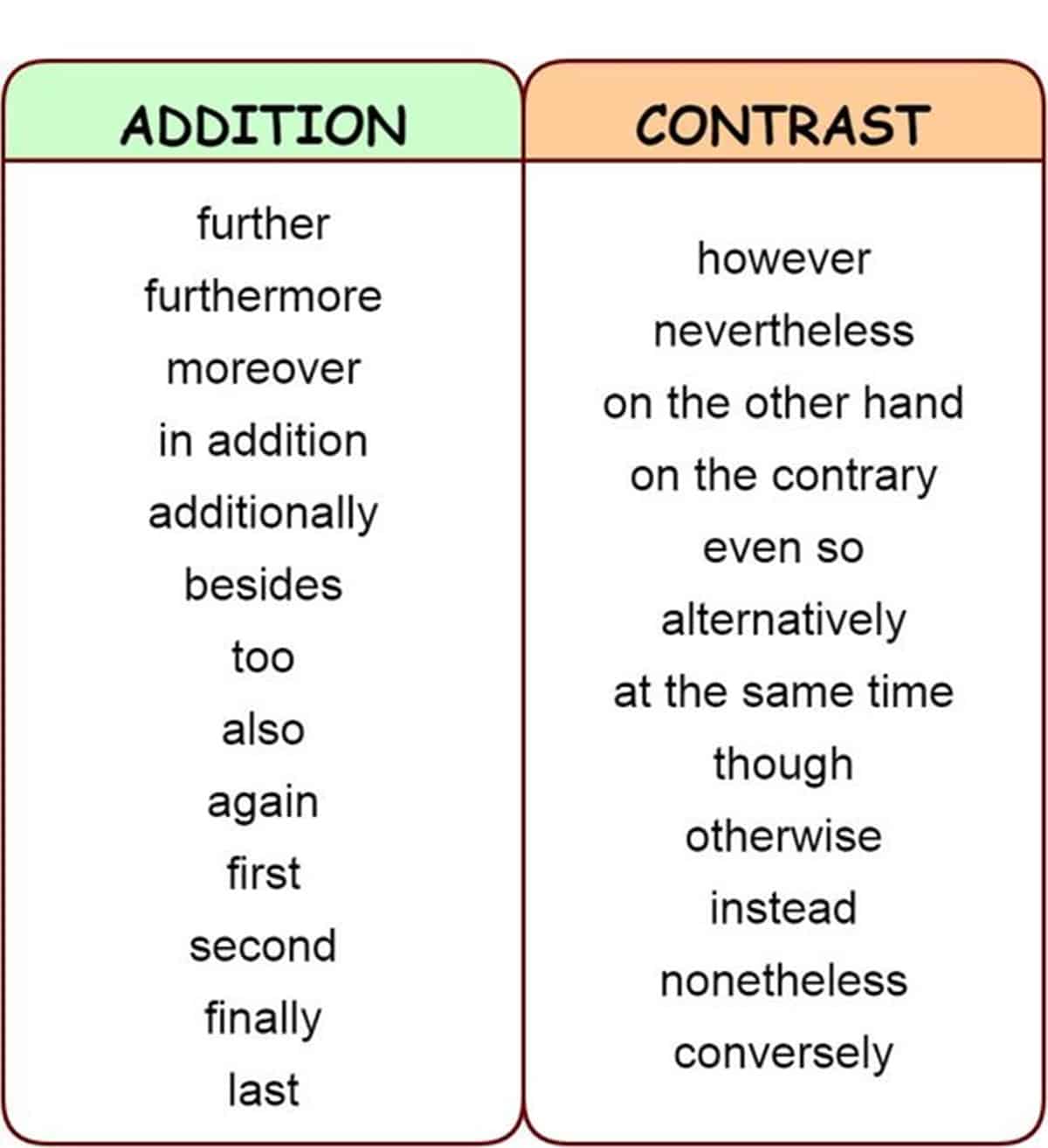
Summarizing
Usage : To sump up what has been previously stated
Linking words :
- In conclusion
- To summarize
- To conclude
- In conclusion , walking is a cheap, safe, enjoyable and readily available form of exercise.
- To summarize , this is a clever approach to a common problem.
- The food was good and we loved the music. Altogether it was a great evening.
- His novels belong to a great but vanished age. They are, in short , old-fashioned.
- To sum up , there are three main ways of tackling the problem…
- In summary , this was a disappointing performance.
- Briefly , our team is now one of the best in the world.
- To conclude , I want to wish you all a very happy holiday season.
Giving Examples
Usage : To provide examples
Linking words:
- For example/ For instance
- In this case
- Proof of this
- There are many interesting places to visit in the city, for example / for instance , the botanical garden or the art museum.
- I prefer to wear casual clothes, such as jeans and a sweatshirt.
- Including Christmas Day and Boxing Day, I’ve got a week off work.
- We need to concentrate on our target audience, namely women aged between 20 and 30.
- I think I would have made a difference in this case .
- This building are a living proof of this existence, so we must preserve it.
- I also make other jewellery like rings and bracelets.
Emphasizing a Point
Usage : To put forward a point or idea more forcefully
- Undoubtedly
- Particularly / in particular
- Importantly
- Without a doubt
- It should be noted
- Unquestionably
- Undoubtedly , the story itself is one of the main attractions.
- I don’t mind at all. Indeed , I would be delighted to help.
- Obviously , we don’t want to spend too much money.
- I love silver earrings, in particular ones from Mexico
- The car is quite small, especially if you have children.
- Clearly , this will cost a lot more than we realized.
- More importantly , can he be trusted?
- He’s an absolutely brilliant cook.
- I definitely remember sending the letter.
- We still believe we can win this series without a doubt .
- I’m neve r surprised at what I do.
- It should be noted that if you have something to note, then note it
- Unquestionably , teaching has been a paramount part of his career.
- Above all , this forest is designed for wear and tear.
- This is positively the worst thing that I can even imagine.

Sequencing Ideas
Usage : To indicate the order of what is being said
- First/ firstly (Second/ secondly, Third/ thirdly, Finally)
- At this time
- Subsequently
- Lastly and most importantly
- Last but not least
- First and foremost
- Firstly , I prefer the train because I can see the landscape.
- At this time , the young man leapt into the air and flew off towards sunset.
- They arrived on Monday evening and we got there the following day.
- I had visited them three days previously .
- Your name is before mine on the list.
- Subsequently , new guidelines were issued to all employees.
- Above all , keep in touch.
- Lastly, and most importantly , you should be optimistic.
- Last but not least , I find I seriously cannot relate to women.
- We will continue to focus on our players first and foremost .
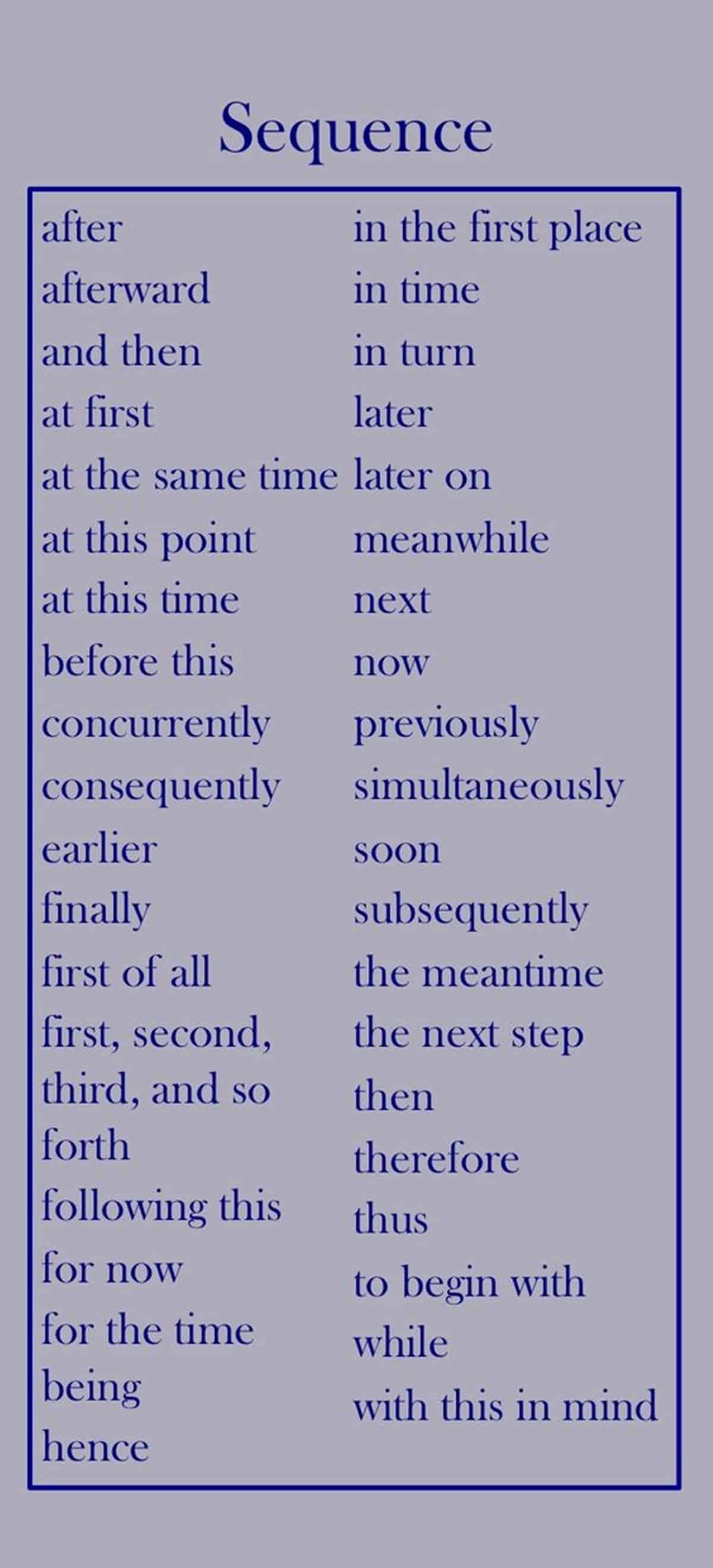
Comparing Ideas
Usage: To show how things are similar
- Compare / compare(d) to(with)
- By the same token
- In the same way
- Correspondingly
- Similarly , the basketball and hockey games draw nearly full attendance.
- Equally , not all customers are honest.
- Her second marriage was likewise unhappy.
- She’s just as smart as her sister.
- Working with housecats is just like working with lions or tigers.
- Some people say I have a running style similar to him.
- Having a power is not the same as using the power.
- He gets the ball off quickly compared to two years ago.
- Teenagers should be more respectful; by the same token , parents should be more understanding.
- Alex enjoys telling jokes; in the same way/similarly/likewise ,his son adores funny stories.
- Correspondingly , the roles each of them played were soon different.
Contrasting Ideas
Usage : To show how things are different
- Nevertheless
- On the other hand
- Nonetheless
- Despite / in spite of
- In contrast (to)
- Alternatively
- Differing from
- Contrary to
- Unlike most systems, this one is very easy to install.
- There is little chance that we will succeed in changing the law. Nevertheless , it is important that we try.
- Laptops are convenient; O n the other hand , they can be expensive.
- The problems are not serious. Nonetheless , we shall need to tackle them soon.
- Despite/ In spite of the rain, I went for a walk.
- In contrast to the diligent bee, the butterfly flies hither and yon with no apparent purpose.
- The agency will make travel arrangements for you. Alternatively , you can organize your own transport.
- Northern European countries had a great summer. On the contrary/conversely , Southern Europe had poor weather.
- Even so , many old friends were shocked at the announcement.
- Differing from his white colleagues, he preferred instructing his scholars to the ambition of acquiring personal renown.
- The situation in Ireland is quite contrary to this principle.

Linking Words for Essays | Images
Below is a handy list of words that are both useful and appropriate to academic language:

Other linking words to give an example or an illustration:
- In this case,
- In another case
- Take the case of
- To illustrate
- As an
- Illustration
- To take another example
- That is
- As shown by
- As illustrated by
- As expressed by

- Recent Posts
- Plural of Process in the English Grammar - October 3, 2023
- Best Kahoot Names: Get Creative with These Fun Ideas! - October 2, 2023
- List of Homophones for English Learners - September 30, 2023
Related posts:
- Linking Words and Phrases: Reasons and Results
- Useful Words and Phrases to Use as Sentence Starters to Write Better Essays
- Popular Linking Words and Transitional Phrases in English
- Transition Words You Need to Know to Master English Writing
Sunday 26th of November 2023
Must say extremely helpful . Stranded as I was nd I found this .theeeee best 10 /10
Momovi Burain
Thursday 10th of November 2022
Very very educational
Sunday 16th of October 2022
what the dog doing
Tuesday 23rd of August 2022
good website with good information
Friday 21st of January 2022
dijah said it is goooooooooooooooooood

Useful Linking Words for Writing Essays in English
Posted on Last updated: July 20, 2019
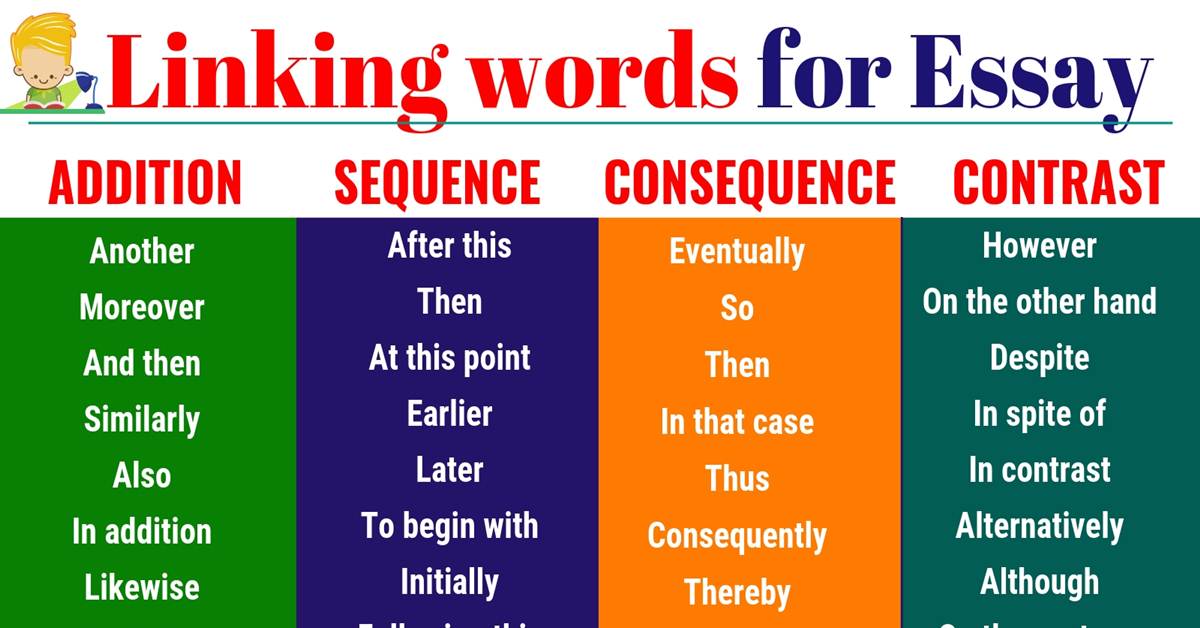
Sharing is caring!
Linking Words ! This page provides a list of useful linking words for writing essays in English for ESL learners.
Table of Contents
Linking Words
Linking words or transition words are words phrases used to connect one idea to the next. Learn linking words list in English.
- In addition
- Furthermore
- Not only … but also
- Besides this
- In the same way
- On the other hand
- In spite of
- On the contrary
- Nonetheless
- Even though
- In contrast
- Alternatively
- In the first stage
- To begin with
- Another reason
- Another advantage
- At this point
- Following this
- A further reason
- In the final stage
- The final reason
CONSEQUENCE
- As a result
- Consequently
- It follows that
- In that case
- Undoubtedly
- The reason why
- In other words
- In order to
- Provided that
- Depending on
- In conclusion
- To conclude
- To recapitulate
Linking Words & Phrases | Infographic

Golani .Chandrakant
Monday 6th of November 2023
Increase of vocabulary, Increase of knowledge
Pombé Guirki Dimitri
Sunday 5th of November 2023
Alright thank you so much! I'm so glad added those in my knowledges
Thursday 20th of January 2022
i dont know what to say but waaaaasssssuuuuupppp
Thursday 22nd of April 2021
thx this is awesome it helps me a lot
Anna Kołodko
Wednesday 24th of February 2021
Thank you for sharing - now I have a full picture what is linking word at all, how many linking words there are and how it is used. :)
Linking Words in English: What Are They and Why Do They Matter?
Published on, june 8, 2022, november 15, 2022, this article may contain affiliate links.
Without linking words, your writing will be harder for readers to understand. This article explains linking words and their importance, gives plenty of examples and provides extra guidance on the most confusing ones.

Table of contents
Have a look at these two paragraphs. Which one sounds better?
Paragraph A
There was heavy traffic. Paolo was late to work. His boss was angry with him. He tried to apologise. His boss simply refused to listen.
Paragraph B
Because of the heavy traffic, Paolo was late to work. As a result, his boss was angry with him. However, when he tried to apologise, his boss simply refused to listen.
Did you find that paragraph B sounds much better? The ideas are connected and the text sounds more sophisticated .
In fact, the only difference between the paragraphs is that, in B, we used four simple linking phrases: because of , as a result, however and when .
What are linking words?
Linking words are sometimes called linking phrases (they can be made up of more than one word), connectors or even linkers.
In short, they connect ideas together. We use them in both writing and speaking, but they are most important in writing because they provide structure to your paragraphs.
Linking words can connect two parts of one sentence. They go at the beginning of a sentence or in between the two parts:
Example 1: Although it was summer, George was wearing a thick coat. Example 2: George was wearing a thick coat although it was summer.
Linking words can also connect an idea from the previous sentence (or paragraph) to the current one:
Example: Paolo was late to work. As a result , his boss was angry with him.
Why are linking words important?
Linking words provide a structure to your writing. They also inform the reader or listener of what is to come:
Example. Maria invited all of her friends to the party. Unfortunately …
The word unfortunately here tells the reader to expect bad news regarding Maria’s party. In speaking, this helps the listener to understand the next part of the message.
Lower-level English learners ( CEFR levels A1-A2) rarely use linking words. Learners at intermediate level (B1-B2) use basic linking words. Learners at an advanced level (C1-C2) use a full range of linking words and phrases, including the tricky ones which we will look at in a moment!
Hence, as your English improves to advanced level, you will need to understand and use a wider range of connectors (such as ‘ hence ’).
Examples of linking words
There are hundreds of linking words and phrases in English. It helps to think of them in different categories, so here is a categorised list with one example of each:
Consequence
- As a result
- Consequently
Example: George was late. As a result , his boss was angry.
Additional information
- In addition
- Furthermore
Example: Social media is addictive. Moreover , it has been shown to cause depression.
Cause and effect
Example: Due to the large volume of requests, we are not accepting further applications at the moment.
Contrasting
- Even though
Example: Pedro is very tall. However , his brother is quite short.
Conditional information
Example: We will only proceed if you sign the documents.
Showing a different opinion
- On the contrary
- On the other hand
Example: People think that wine is unhealthy. On the contrary , a glass or two a day can improve longevity.
Clarification
- To be clear
- In other words
Example: These settings will disrupt the adaptive algorithms in the logic subroutines. Simply put , it will cause the computer to stop working.
- Nonetheless
- Nevertheless
Concession , or conceding, means admitting you were wrong or admitting that one part of your statement was problematic.
Example: George doesn’t believe in God. Nevertheless , he cannot explain how the universe came to exist.
- In a nutshell
- On the whole
- All things considered
Example: In this essay, we have seen the many problems related to using coal. All things considered , it is not a suitable form of energy.
Tricky linking words
Here is a list of tricky linking words. These are all words that my own students often ask me to explain.
Because/Because of
These two terms have the same meaning, but the way that we use each one is different.
Because connects two independent clauses . If we wish to ignore confusing grammar terms, this means it joins two complete sentences:
Example: The traffic was bad because it was raining.
Whereas, because of joins one complete sentence to one noun or noun phrase. (A noun phrase is simply a noun made up of more than one word.)
Example: The traffic was bad because of the rain.
More examples:
Example: George lost money because the stock market went down. Example: George lost money because of the stock market.
Conditional sentences are sentences that state a possible condition, usually with the word if , but also with words like unless .
Conditional sentences in English are quite complex. We have the first conditional, the second conditional, the third conditional and even something called the zero conditional!
Let’s look at the second conditional if sentence, the one that causes the most confusion.
Example: If I had wings, I would fly like a bird.
Immediately after the word if, we use a past tense verb… even though the sentence is not in past tense. What tense is it in? Well, that’s the tricky part. A second conditional sentence describes an imaginary situation, so we can’t really say it’s present, past or future. It’s just imaginary.
Note that we use the past tense in one part of the sentence and the modal verb would in the other. Here are some further examples:
Example: If I had a billion dollars, I would be rich. Example: George would be sad if he didn’t have any friends.
When is a pretty straightforward linking word, but it does have one quirk . What do you notice about these sentences?
Example 1: When Rafael visited, we drank root beer. Example 2: When Rafael visits, we drink root beer. Example 3: When Rafael visits, we will drink root beer.
Did you spot it? In the past tense, both sentence parts use a past tense verb. In the present tense, both sentence parts use a present tense verb. But in the future, the verb immediately following when remains in the present tense.
Incorrect : When I will go to Japan, I will visit Mount Fuji. Correct : When I visit Japan, I will visit Mount Fuji.
Why does English have such weird rules? Now that’s a good question!
My students often confuse unless and if . The meaning of unless is something similar to: if…not . This can be very confusing if you do not have a similar word in your own language.
Incorrect : I will take an umbrella unless it is raining. Correct : I will take an umbrella unless it is sunny. ( If it is not sunny)
Even though/even if
We can use even to make though or if stronger.
Be careful not to confuse these two. Even though has the same meaning as though/although , but the word ‘even’ shows that it is surprising or unexpected in some way.
Example: Even though Luigi is Italian, he doesn’t eat pasta.
Even if works the same way. The meaning is the same as if , but surprising or unexpected.
Example: Even if I had a billion dollars, I would still want more.
There are many linking words that look like you could use them to connect two parts of a sentence… but you can’t. However is the most common one.
Note the following examples:
Incorrect : I went to Mikhail’s house, however he wasn’t home. Correct : I went to Mikhail’s house. However, he wasn’t home.
We can use however to connect two ideas , but we cannot use it to join two sentence parts , like we do with but or although . We need to begin a new sentence.
Other words that are used in the same way are moreover , therefore and furthermore .
However, there is a “ workaround ”: semicolons.
Yes, I know, a semicolon is not a ‘word’, but I would like to mention it anyway.
My students often ask me what semicolons are for.
Here’s the answer. We can use a semicolon to connect any two sentences as long as the ideas in each sentence are related.
Let’s see some examples:
Incorrect : I didn’t enjoy the play it was too long. Correct : I didn’t enjoy the play; it was too long.
This is a writer’s trick. If you are not sure which linking word to use, just use a semicolon!
We can also use it to ‘correct’ sentences with however , moreover , therefore and furthermore :
Incorrect : I went to Mikhail’s house, however he wasn’t home. Correct : I went to Mikhail’s house; however, he wasn’t home.
In fact, this is a very common way to use semicolons.
Whatever/However/Whenever
When we add ‘ever’ to these words, we make them more general:
Whoever = anyone that However = any way that Whenever = anytime that Whatever = anything that Whichever = any one that Wherever = anywhere that
Here are some examples:
Example: You can come visit me whenever you want. (You can come visit me anytime that you want.)
Example: Whoever wins the contest will be rich. (Anyone who wins the contest will be rich.)
Example: You can use the information however you want. (You can use the information any way that you want.)
Again, these words are tricky because there may not be a direct translation for them in your own language. Thus, you may not think to use them when speaking English.
However, it is good to push yourself and use structures which are uncommon in your mother tongue. When you do this, you know your English is nearing an advanced level.
Improving your linking words
There are so many more linking words out there. To reach an advanced level of English, you will want to know as many as possible, and then use them in your own English. What is the best way to do this?
I have two tips that are perfect for independent learners:
1 Be curious
Every time you digest information in English, whether it is reading, watching videos or listening to podcasts, be curious. Listen out for linking words that you haven’t heard before.
When you hear a new one, write it down and see if you hear it again. After hearing it two or three times, try using it yourself.
2 Proofread
You do proofread your writing, don’t you?
Proofreading is the perfect time to go back through your text and examine the structure. Is it clear? Or should you add some linking words to help guide the reader?
Follow these tips and you will master linking words before you know it !
You might also like
🌍 announcing…translations in 12 languages.
![englisch essay linking words 10 Activities to Improve Your English Vocabulary [Self-Study Guide #6]](https://assets-global.website-files.com/5d70d85d6d5a384776dc97e4/636d1bfeca23fd0e93ef3ec0_Best%20English%20Vocabulary%20Activities.png)
10 Activities to Improve Your English Vocabulary [Self-Study Guide #6]

Synonym Practice | How Smart English Learners Improve Their Vocabulary

Home » Linking Words in English with Examples
Linking Words in English with Examples
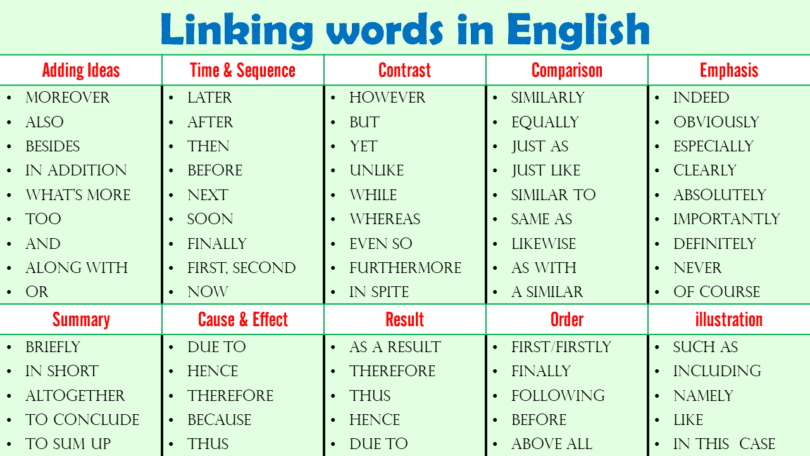
Linking words plays a vital role in joining ideas in writing, acting as the glue that holds sentences and paragraphs together. They ensure easy changes between thoughts, making the text quite coherent and easy to follow. If your writing has some issues, you need to learn to link words that can help improve its structure. In this blog post, we’ll describe the significance of linking words and provide a helpful list that would surely improve your writing. Whether you’re a student working on an essay, or a professional drafting a report, Learning linking words is quite compulsory. They serve in sentences as guides, which lead the readers clearly through your text, much similar to road signs on a journey. Without them, your writing may get disorganized and confusing, but if they are used with some strategy, you can create a clear and logical flow for your readers to follow.
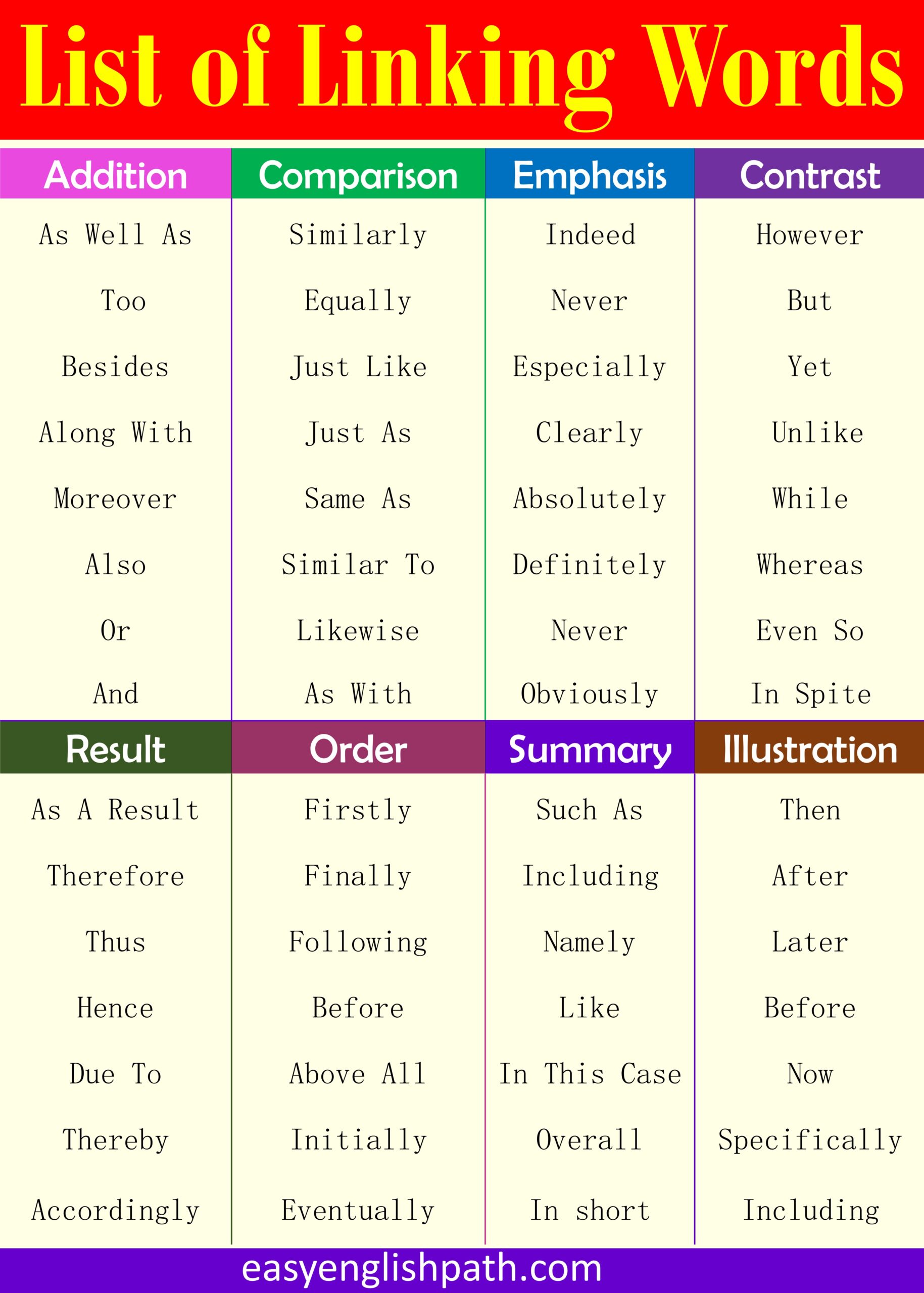
Types of Linking Words
These words can be the linking words of the following elements, ideas, conclusions, contrasts, likes, dislikes, summaries, consequences, examples, reasons, effects, comparisons, emphasis, and results. As a matter of fact, English is a very hard language, and you would probably get confused about how to utilize various linking words in different types of sentences or phrases . So, I have tried to put different linking words in sentences to make it easy for you to learn what actually linking words. are and how they work.
Linking Words Use in Sentences
Moreover What can I use instead of moreover?
Also Hina is also a hard-working girl.
Besides Besides these books, all others are very helpful to you.
In Addition We take 2 more ingredients in addition to garlic.
What’s More What’s more, I will discuss it with you later.
Too I am too much tired.
And Mariam and Hina are the best friend.
Along With We should always stand along with our parents.
Or We can take tea or milk after dinner.
Summary Write the summary of the last lesson.
Briefly Tell me your statement briefly.
In Short In Short, he is a cheater.
Altogether They work altogether.
To Conclude To conclude he listen to my statement completely.
To Sum Up We have only 1 minute, to sum up, our discussion.
Time & Sequence Know the value of time and sequence.
Later We will discuss later.
After He was regular after punishment.
Then I go to school and then I met my friend.
Before He was lazy before exam.
Next His house is next to me.
Soon The next season is coming soon.
Finally Finally, he was punished by the police.
First, Second First, second, and third conditional sentences are important.
Now He seems a gentleman now.
Cause & Effect Discuss the causes and effects of hepatitis.
Due To I am absent due to fever.
Hence We are travelling, hence we can’t attend the meeting.
Therefore Alia is a hard-working student therefore she got good grades.
Because I am feeling tired because of work.
Thus I was hungry thus I have eaten 2 pieces of bread.
However Mariam was feeling ill however she went to work.
But I was going to market but I changed my decision.
Yet I didn’t get any notification yet.
Unlike . He is completely unlike his mother.
While She sent her a text while studying.
Whereas He is careful whereas I take the risk.
Even So The hypothesis is diagnosed even so further research is required.
Furthermore Furthermore, I will tell you later.
Contrast Contrast is essential in dressing.
In Spite of In spite of insult, he managed to keep his temper.
As A Result She was late as a result of the rain.
Contrast Abdullah is tall and strong in contrast, Ali is so handsome.
Due to I can’t go to school due to heavy rain.
Resul t The result of the 8th grade is going to be announced on 31 Aug.
Similarly Similarly, we shall discuss the topic of content writing.
Equally They participated equally in this tournament.
Just As I like the cooking just as eating.
Just Like Khadija’s dresses are just like Mariam’s dresses.
Similar To Her mobile is similar to my mobile phone.
Same As I made rice the same as in the given recipe .
Likewise I think apples are good, likewise, I think oranges are good.
As With I like mango as with apple.
A Similar He has a similar dress to me.
First/Firstly Firstly, Let me know your name.
Finally Finally, I got good marks in the exam.
Following We are following the given instructions.
Before I am getting ready before the function.
Above All Explain the above all given questions.
Indeed Indeed, Allah is the best creator.
Obviously I will come on Tuesday.
Especially Especially I would like to eat mango.
Clearly I am telling you everything about the previous story.
Absolutely You are absolutely right.
Definitely Definitely I’ll show you, my shoes.
Never I will never fight again.
Of Course Of course you are right.
Such As You can follow the conditions such as given below.
Including Onion garlic and green chili are included in the pulao recipe.
Namely I like many fruits namely Apple, Banana, Mango etc.
Like I like an apple.
In this Case In this case, I chose option A.
Illustration I like the illustration.
Emphasis There was an emphasis on student participation.
But I wish I help you but I have a financial problem too.
Although Mariam buys many toys although toys are costly.
However I like mango however it disturbs my stomach.
Unless She will never agree to go with me unless her brother permits her.
Except All is good except my mother.
If If I make a tea then will you take it?
Apart from Apart from football, he plays basketball and tennis.
As long as As long as you try, you can succeed.
Different Uses of Linking Words
Giving examples.
Below are some words that can be used to when you want to quote or offer an examples in a conversation. These words are used at the beginning and middle of a sentence.
- For example
- For instance
- Specifically
- To illustrate
- To demonstrate
- As an illustration
- In particular
- Let’s say
- In the case of
- As a case in point
- Take, for example
- One example of this is
- In this case
- To give an example of
- For one thing
- To emphasize
- To highlight
- In other words
Summarizing Words
Below are some words that can be used to when you want to describe the summary of a conversation.it is important to note that these words can be used both at the beginning and middle of a sentence.
- In conclusion
- To recapitulate
- To put it briefly
- In a nutshell
- To conclude
- To summarize
- To briefly recap
- So, in essence
- As a result
- Consequently
- Accordingly
- For these reasons
- To reiterate
- To draw a conclusion
Adding Information
Below are some words that can be used to when you want to add some information to the ongoing conversation. it is important to learn that these words can be used both at the beginning and middle of a sentence.
- Furthermore
- Additionally
- In addition
- Not only… but also
- Apart from that
- What’s more
- Another key point is
- In the same vein
- Furthermore, it should be noted that
- Moreover, it’s important to mention
- In addition to this
- Besides this
Sequencing Ideas
Below are some words that can be used to when you want to arrange different elements of a conversation in a logical manner. it is important to learn that these words cab be used both at the beginning and middle of a sentence.
- Subsequently
- In the meantime
- Simultaneously
- In the following
Words for Giving a reason
Below are some words that can be used to when you want to arrange different elements of a conversation in a logical manner. it is important to learn that these words can be used both at the beginning and middle of a sentence.
- For the reason that
- Inasmuch as
- Seeing that
- Considering that
- On account of
- As a result of
- For this reason
Words for Giving a result
Below are some words that are used to when the purpose is to offer a reason for any action that happens. it is important to learn that these words can be used both at the beginning and middle of a sentence.
- That’s why
- Because of this
- For that reason
- On that account
- As a consequence
- With that in mind
- In consequence
- Resulting in
Words for Contrasting Ideas
Below are some words that are used to when the purpose is to describe two or more ideas that are totally opposite in nature. it is to be kept in mind that that these words can be used both at the beginning and middle of a sentence.
- Nevertheless
- Nonetheless
- On the other hand
- In contrast
- Even though
- Despite this
- In spite of that
- Alternatively
- On the contrary
- Notwithstanding
You May Also Like
- Prepositions List with Examples
- Linking Verbs in English
- Modal Verbs in English Grammar
You may also like
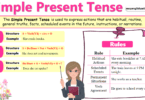
Simple Present Tense: Examples and Explanation
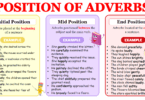
Position of Adverbs: Usage and Examples In English
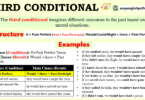
Third Conditional Sentences with Examples In English
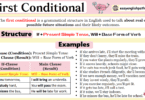
First Conditional In English Grammar with Examples
AllAssignmentHelp.com
Linking Words To Use In An Essay
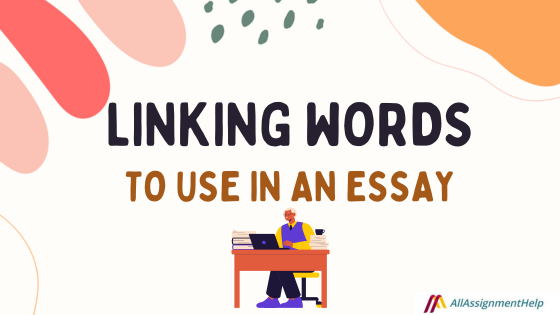
Table of Contents
Concerned that your essay isn’t logical or has enough structure? You can include linking words, or transition words to make it stronger.
An essay is a crucial type of academic paper. It needs to have a clear flow so that the readability is perfect. Precisely stated, the sentences you create should naturally flow into one another. However, using linking words helps ensure that the sentences in your essay make sense. The words serve as the perfect linkers and overpasses to break up sentence segmentation. Additionally, these words can be used to present a conclusion, provide details, summarise, highlight a point, arrange material, compare and contrast ideas, and give illustrations. You might not be aware of these words and how to use them in your essay writing. Don’t worry. We are here to help you! This blog of All Assignment Help will let you know all about linking words and how you can use them in your essay writing to make it more effective and readable.
What are Linking Words?
Linking words are those words that showcase a connection between sentences. They help in forming the uniformity in the essay. Often referred to as transition words, these words serve to establish a connection between paragraphs or other essay sections. Linking words serves as a means of connecting the ideas or thoughts expressed in essays.
Moreover, the use of linking words makes your writing look more logical. Thus, you should use proper linking words to reduce the reading efforts of the readers. Your essay shouldn’t cause readers mental strain to understand it. Therefore, it is essential to make things simple for them.
Essays commonly use linking words in the following places:
- The beginning of a paragraph
- Beginning of a statement that expands on an argument or presents something new
- At the start of a concluding statement
However, you need to use the right to link it from one another sentences or paragraphs. For example, when you are writing an argumentative essay , you need to make sure the flow of linking words is correct and logical so that the argument you are presenting sounds accurate.
Read Here: Words You May Find Confusing
The Reasons Behind Using Linking Words in Essays
Essay sentences that link is a crucial component of academic writing. To put it another way, you cannot write a paper without using them. Otherwise, readers will not understand what you have written. Linking words in the essay are used to:
- Link concepts in your writing
- Organize your ideas and arguments so that readers can follow along and grasp what you are trying to communicate.
- Lead readers from one concept to the next while highlighting their connections.
- Draw readers in and encourage them to continue reading the following sentence or paragraph
- Provide more details
- Strengthen or disprove an argument
- Show the outcome, draw a conclusion, and illustrate how this or that point is affected
Every phrase and paragraph in an essay must lead the reader to the next one using essay maker and connecting words. The purpose of these transitional words is to help readers move from one idea or point to the next.
Three Main Types of Linking Words
There are three main types of linking words i.e. coordinating conjunctions, subordinating conjunctions, and correlative conjunctions. Let’s discuss these three more briefly.
Coordinating Conjunctions
Coordinating conjunctions are utilized to join two or more equally important items. Another name for them is FANBOYS, which is a shorthand for For, And, Nor, But, Or, Yet, and So.
For example, she is putting a lot of effort into her studies to gain admission to a reputable university.
Subordinating Conjunctions
A subordinate clause is joined to a main clause by a subordinating conjunction. However, the supporting clause cannot stand alone as a sentence and is of lesser significance than the main clause.
For example, she stayed home from work because she felt sick.
Correlative Conjunctions
Correlative conjunctions are utilized in pairs to connect two things of equal value. They are used to illustrate the connection between two concepts.
For example, not only did she finish her work, but she also helped her colleagues.
You can learn about the types of linking words by taking an online course. You can also hire someone to take your online class for you to get professional assistance which will help you in acing your online course with great credits.
Useful Linking Words for Essay Writing
It is not an easy task to compose a compelling essay. If you want to make your essay more appealing and expressive, focus on research, presentation, and persuasion. However, if you don’t have a knack for writing, then you will fail miserably in forming a logical essay with judicial use of linking words.
There are various categories of linking words one can use while writing an essay. Here, you will share the main categories and word lists to be used while framing an essay.
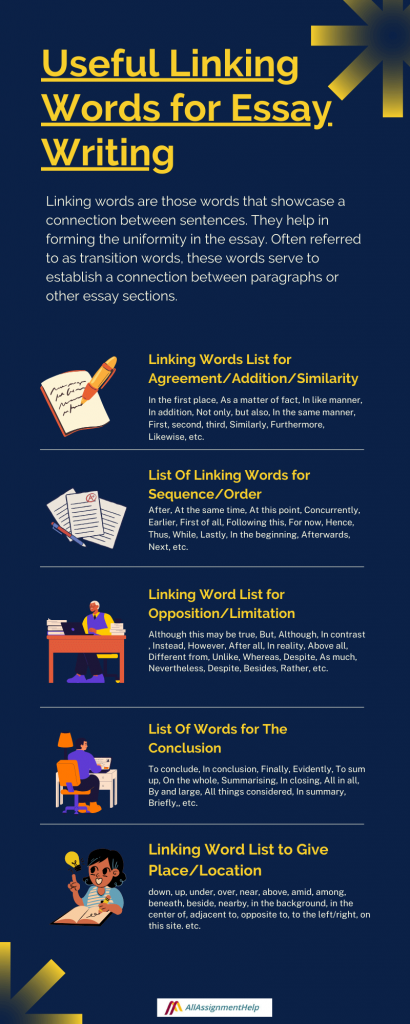
Linking Words List for Agreement/Addition/Similarity
Using linking words can help the reader understand further remarks or concepts in a statement. They might also convey agreement or similarities. These words are also known as additive transition words, which are often utilized in narrative and explanatory essay writings. The words used to link in such context are:
- In the first place
- As a matter of fact
- In like manner
- In addition
- Not only, but also
- In the same manner
- First, second, third
- Not to mention
- In the light of
- Furthermore
- Comparatively
- At the same time
- Together with
- Identically
List Of Linking Words for Sequence/Order
Any kind of essay needs to have flow. Your essay will lose its brilliance if there is a lack of consistency or logical flow of ideas. Here is a linking word list that helps by showing a sequence order in the essay.
- First/ Second/ Third or Firstly/ secondly/ Thirdly
- Primary/ Secondary
- At this point of time
- Concurrently
- First of all
- Following this
- The next step
- In the beginning
- It all started when
- Once upon a time
- To begin with/ To start with
Linking Word List for Opposition/Limitation/Contradiction
However, certain linking words provide additional information, these transitional words and phrases convey opposing concepts in writing. These are:
- Although this may be true
- In contrast
- Different from
- On the other hand
- On the contrary
- Nonetheless
- Even so/though
- Nevertheless
List Of Words for The Conclusion
An essay with a strong conclusion is considered to be excellent. Unfortunately, most students conclude their essays with nearly the same words, but you have the opportunity to do so here. Look at the linking words list for an excellent conclusion:
- To conclude
- In conclusion
- On the whole
- Summarising
- By and large
- All things considered
- In the long run
- For the most part
- By the large
- Consequently
- As a result
Linking Word List to Give Place/Location/Geographical Area
They can be used alone or in combination with words from other categories. They are almost often used together with other terms from the aforementioned groups. They are used to define, limit, or restrict space like the time ones. However, students often face difficulties when using linking words to write about a place and location, which ultimately leads them to buy online essay writing help from professionals. Here is your list of words that you can use to give a location or place.
- in the background
- in the center of
- adjacent to
- opposite to
- to the left/right
- on this site
List of Linking Words for Examples/Support/Emphasis
Transition words that provide examples or strengthen an idea might be used in your essay writing. Here is a list of words that can be used to improvise such contexts:
- In other words
- To put it differently
- For one thing
- In particular
- As an illustration
- In this case
- For example
- For instance
- For this reason
- To put it another way
- To demonstrate
- That is to say
- With attention to
- By all means
- To emphasize
Words for Reason/Reference
You can use these linking words to explain connections between concepts and give explanations for what has started or happened.
- for the purpose of
- seeing that
- with this in mind
- as applied to
- the fact that
- granted that
- in order to
- with this purpose
- considering
- in connection to
- with regards to
- provided that

Linking Words for Time/Chronology/Sequence
Another function of linking words in literature is to illustrate chronology or sequence. These expressions give time a meaning that is included in the time category. These are the types of words that appear in the introduction of an essay when a writer outlines the structure of the work.
- Sooner or later
- Up to the present time
- To begin with
- Straightaway
- In the meantime
- In a moment
- Without delay
Linking Words for Outcomes/Impacts/Repercussions
These particular words are used to demonstrate how one item affected another, to illustrate the outcomes of an action, or to demonstrate how something affected something else. A short list of transitions that work well for this specific category is shown below.
- consequently
- for this reason
- in that case
- as a result
Also Read: Your Guide Towards Writing An Outstanding Short Essay!
Final Thoughts!
The importance of linking words in essay writing cannot be overstated. These words are crucial for connecting concepts and making your essay read as a cohesive whole. Your essay will flow more naturally the more well-organized your thoughts are. Additionally, your writing will have a logical framework and an engaging read when you make use of linking words correctly.
However, to learn more about these words, you can choose to sign up for an online English class. An online English class will help you boost your knowledge about linking words and how you can use them in your writing. Furthermore, whenever you find yourself struggling with your English class and want to pay someone to take my online English class for me, you can hire an online class helper who will be there to take your worries aside.
Breakout English

Linking words – How to improve your writing
Linking words, also known as linkers, cohesive devices, connectors and transition words, are a vital part of writing. Often when we teach English, we feed vocabulary and phrases to students which, if we’re not careful, can start sounding forced. For me, linking words are the exception to that. I find that a solid lesson with these special words can almost certainly help improve a students writing regardless of the level. It’s not just because it appears in writing marking scales for every official exam there is, it’s because they actually work. Without linking words, texts can feel dull and disconnected. That’s definitely not the image we want to give when trying to prove our level of English.

What are linking words?
There are linking words and phrases for different purposes. You can find exhaustive lists of linking words examples all over the web, but the important thing is using them to good effect.
If your writing was like the human body, the content words would be the flesh and the paragraph structure would be the skeleton. Linkers are like the joints of your writing. They help to connect the different parts together and interact with each other. An essay with good cohesive devices will flow and be easy to read. In fact, it’s practically impossible to write without them. You can do a fun writing activity with a consequences game in another post .
Linking words at different levels
Let’s use Cambridge writing scales as a guide for what we should be using at different levels. At B1 Preliminary (PET) candidates are expected to use basic linking words. Basic linking words are essentially and , so , but and because . At B2 First (FCE) level, a variety of linking words should be used. While by C1 Advanced (CAE), candidates are using cohesive devices to generally good effect.
Although the terminology shifts between levels, the concept is the same. An exam candidate’s writing should be connected together in a way that makes it flow from one section to another using words that help to achieve said outcome. Notice that it’s not until C2 Proficiency (CPE) level that candidates should be able to use cohesive devices with flexibility.
For more information about how Cambridge writing is marked, check out the different scales here .
If you’re looking to improve your writing for the Cambridge Advanced exam, consider our book Cambridge Advanced Writing Plus .
Linking words examples
There are so many transition words you can use in your writing, but having a ridiculously long list isn’t the best option in this case (and I’m normally a big fan of lists). When I teach writing, I tend to focus on a selection of common and useful linking words. These can be associated with their purpose. Words similar to and are used to add additional information. Words similar to but are used to contrast ideas. Words similar to so provide result and those similar to because develop reason.
This list is not exhaustive, but it’s enough for 90% of learners who are using linking words in English. These are good cohesive devices for an essay, a formal letter or a report. They can be used in a wide range of styles and contexts. Keep in mind that linking words and phrases are also a strong indication of formality in a text, but they aren’t the only factor.
The other essential factor to consider with linkers is how to use them in a sentence. Different ones need different grammatical structures surrounding them. This is what the activity below focusses on in detail.
The materials
There is little doubt that any exam preparation course will include a lesson on producing cohesive writing. These materials associate complex linkers with simple comparison words before putting them to use. We’ll consider both the meaning and the use of linking words and phrases. The topic focuses on money and wealth, which can pop up anywhere from B1 level onwards. Use them to improve writing skills, especially in formal writings like essays, reports and proposals.
EXAM PART : Writing
EXAM SKILLS : Using cohesive devices to improve organisation
TOPIC: Money
TIME: 60 minutes
PREPARATION: One copy of the worksheet per student
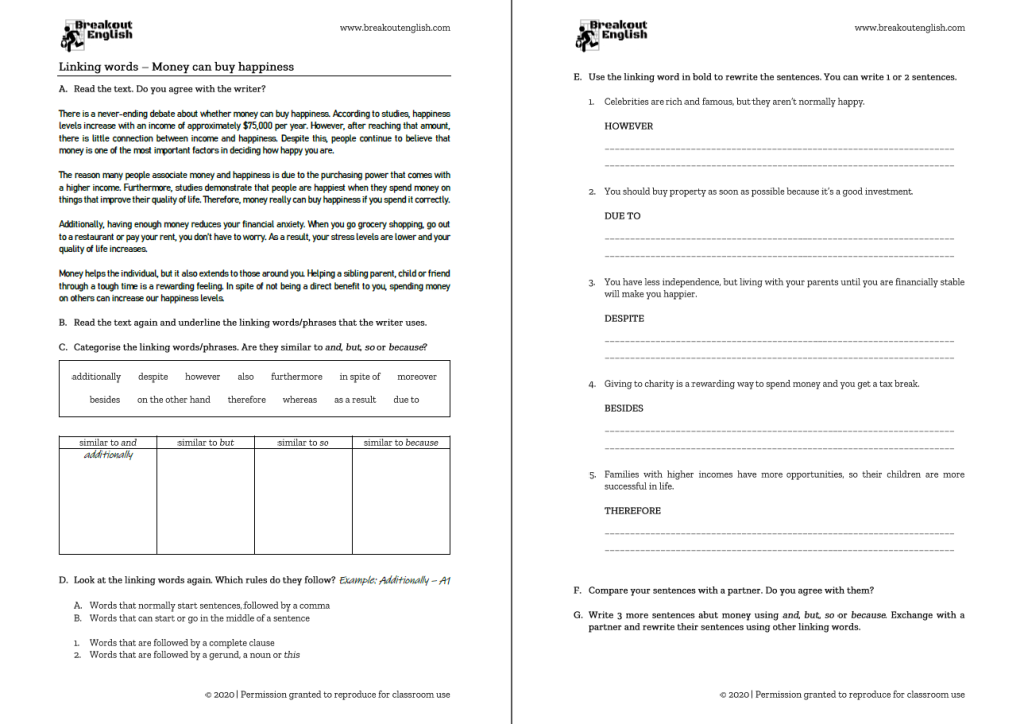
Linking Words in English with Examples
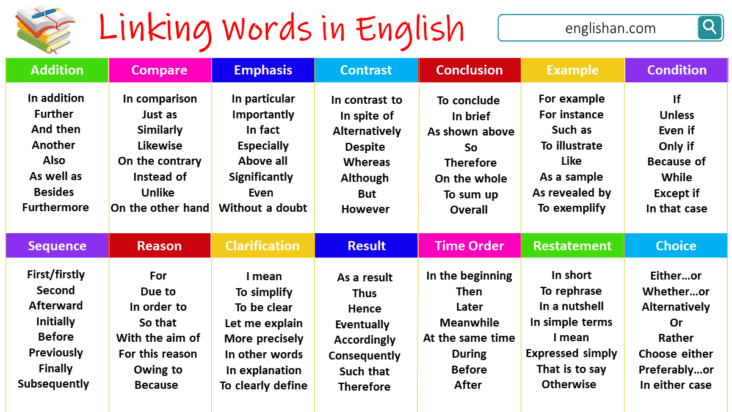
Linking words, also known as transition words or connectors , are defined as words or phrases that connect clauses, sentences, paragraphs, and ideas together, and convey the intended meaning more clearly and effectively. These words not only make the text readable but also help the readers to understand the writer’s perspective. We can use these words to express ideas, contrast, comparison, order, cause and effect, time, and many other functions. Linking words is an essential part of writing to “link” all your ideas in a way that helps create a smooth flow and connections between different parts of a text. In this article, we will take a comprehensive look at what linking words are, their functions with examples, and how to use them effectively. So, let’s get started!
Table of Contents
What are linking words?
Linking words are words or phrases that we use to link or connect different parts of a text. They help make the writing smoother and show how different ideas are related to each other. Linking words make it easier for readers to understand the flow of information and how one idea leads to another. Linking words can be used to indicate contrast, similarity, cause and effect, time, addition, conclusion, and more. Examples of linking words include “and,” “but,” “because,” “however,” “also,” “for example,” “therefore,” and so on. For instance,
She wanted to go shopping; however , it started raining.
Here connecting word “However” indicates a contrast between her desire to go shopping and the unexpected rain, helping the reader understand the change in the situation.
Why use linking words?
Linking words are essential for effective writing because they:
- Improve flow and coherence
- Help establish relationships between ideas
- Make writing smoother to read
- Create clear transitions between paragraphs
- Enhance reader comprehension and understanding
- Linking words can help to emphasize and clarify important points
How to use Linking Words
Here are some basic rules for the placement and usage of linking words:
- Before using linking words, make sure you understand what they mean and how they are used. For example,
Some words are used to add new ideas such as, ( “furthermore” or “moreover” ) while others are used to show contrast or contradiction, ( “however” or “nevertheless” ) etc.
- Choose the appropriate linking word based on the context, for example,
(“Additionally” for adding, “For example” for illustrating)
- Place linking words at the beginning or middle of sentences for smooth transitions.
- Use a comma after starting a sentence with a linking word, for example,
However , I decided to give it a try.
Add commas around the linking word if placed in the middle, for example,
In this case , however , the outcome was unexpected.
- Coordinating Conjunctions (and, but, or, nor, for, so, yet) connect equal parts ( independent clauses ), use a comma before them. for example,
I like apples , but he prefers oranges.
- Subordinating Conjunctions (although, because, since, while, when) introduce dependent clauses , use commas when dependent clause precedes the main clause. for example,
Although it was raining , we went for a walk. (Comma before main clause)
No comma if subordinate clause follows main clause. for example,
We went for a walk although it was raining. (No comma)
- Maintain parallel structure (similar grammar) when using multiple linking words in a list. for example,
She likes reading, to cook, and watching movies. ❎
She likes reading, cooking, and watching movies. ✅
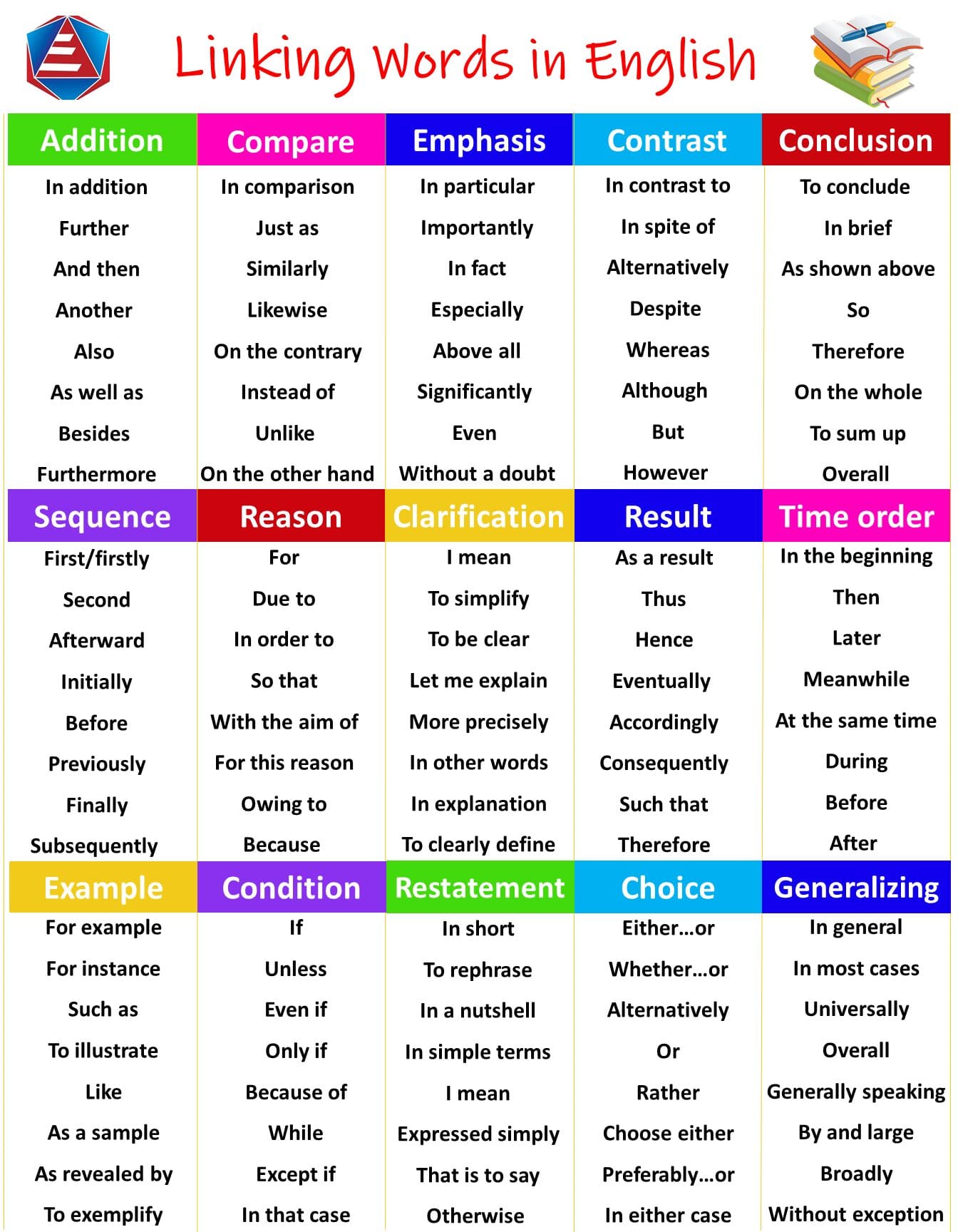
Functions of linking words
Different linking words serve different purposes/functions:
Linking words like “and,” “also,” “besides,” “furthermore,” and “moreover” are used to introduce additional information or ideas that are related to the previous point. Common linking words for addition include: and, also, as well as, additionally, furthermore, moreover, in addition, besides, not only…but also, etc.
Example: I love both chocolate and vanilla ice cream.
Contrasting Ideas
Words such as “but,” “however,” “although,” and “on the other hand” help introduce a contrasting idea or point that is different from what was previously mentioned. Examples of contrastive linking words are: but, however, on the other hand, yet, and, although, nevertheless, in contrast, whereas, although, and even though, etc.
Example: He wanted to go out. However, it started raining heavily.
Cause and Effect
Linking words indicate the relationships between cause and effect. They help explain why something happened or the consequences of an action. Common cause-and-effect linking words are; because, so, therefore, due to, resulting in, consequently, therefore, thus, hence, etc.
Example: He missed the bus; consequently, he arrived late.
These words help you show similarities or likenesses between ideas. They allow you to compare and contrast different concepts. Examples include; like, similarly, in the same way, and compared to, likewise, just as, just like, in contrast, on the contrary, unlike, etc.
Example: The first book was good, but the second one was even better.
Time Sequence
Linking words help arrange ideas chronologically or in a specific order. They guide readers through a sequence of events or steps. Common time sequences linking words are; first, next, then, finally, meanwhile, after, before, afterward, subsequently, eventually, etc.
Example: First, we went shopping. Then, we had lunch at a cafe.
Example/Illustration
Linking words are used to provide examples that clarify or support the main point. They make your ideas more concrete and relatable. Examples of these words include “for example,” “such as,” “specifically,” and “in particular” etc.
Example: There are many outdoor activities you can try, such as hiking, biking, and camping.
Conclusion/Summary
Linking words are used to provide examples that clarify or support the main point. They make your ideas more concrete and relatable. Examples of these words include “for example,” “such as,” “specifically,” and “in particular.” etc.
Example: To sum up, regular exercise has numerous health benefits.
These words can be used to emphasize a point or to highlight its significance. They guide readers to pay attention to specific information. Examples are “especially,” “notably,” “indeed,” and “importantly.”
Example: The view from the top of the mountain was truly breathtaking.
Clarification
These words aid in clarifying or restating an idea to ensure readers understand it correctly. They help avoid confusion. Examples include “in other words,” “that is,” “to put it differently,” and “namely.”
Example: “The concept is a bit complex. In other words , it might take some time to fully understand.”
Expressing Purpose
Linking words like “in order to,” “so that,” and “for the purpose of” indicate the purpose or intention behind a certain action or statement.
Example: He worked overtime for extra money.
Sequence/Order
Words like “firstly,” “next,” “then,” “finally,” and “in conclusion” help to organize and sequence ideas in a logical order.
Example: First, we went to the park. Then, we had a picnic.
Linking words like “if,” “unless,” “provided that,” and “in case” introduce conditions or circumstances under which something else will happen. They show that one thing depends on another.
Example: If it rains, we will stay indoors.
List of Linking Words & Connecting Words
- Additionally
- Apart from this
- As well as that
- Coupled with
- Furthermore
- In addition
- In addition to this
- In the same fashion
- Not only…but also
- Not to mention
- Together with
- What’s more

- Alternatively
- By contrast
- In spite of
- As opposed to
- Contrary to
- Differing from
- In contrast to
- In opposition
- Nevertheless
- Nonetheless
- Notwithstanding
- On the other hand

Showing Cause and Effect
- As a result
- Consequently
- For this reason
- On account of
- Resulting from
- Under the circumstances
- In consequence of
- As a consequence
- The outcome is that
- The effect of this
- This has led to
- Such is the case
- Accordingly

- In comparison
- In the same way
- Correspondingly
- Compared to/with
- In a similar fashion
- On the contrary
- At the same time

Time sequence
- First of all
- In the beginning
- To start with
- Subsequently
- Following that
- Simultaneously
- Concurrently
- In the meantime

- For example
- For instance
- To illustrate
- In particular
- Specifically
- As an illustration
- To demonstrate
- As shown by
- In the case of
- One example is
- As evidence
- In other words
- As a case in point
- To put it differently
- As revealed by
- A good example of this is
- In a similar manner
- This can be seen when
- As a specific instance
- To exemplify
- As a sample
- In one instance
- Let’s consider
- As an example of

- All things considered
- As demonstrated above
- As shown above
- As you can see
- By and large
- Given these points
- In any event
- In conclusion
- Generally speaking
- In the final analysis
- On the whole
- To conclude
- To summarize

- Clearly, then
- Importantly
- Most importantly
- Significantly
- Undoubtedly
- Without a doubt
- Unquestionably
- It’s worth noting
- It should be emphasized that
- It’s important to highlight
- A key point to remember
- To highlight
- It’s important to note
- To draw attention to
- It cannot be overstated

- In explanation
- To be clear
- Let me explain
- To put it clearly
- Simply stated
- That is to say
- To break it down
- More precisely
- To clearly define
- Allow me to clarify
- To put it in another way
- To simplify

Expressing Purpose, Reason
- For the purpose of
- Granted that
- With this purpose
- Provided that
- Seeing that
- With this in mind
- In order to
- With this intention
- With the aim of

- First/ firstly
- Second/ secondly
- Third/ thirdly

- Although this may be true
- In that case
- On the condition that

- Option 1 or Option 2
- Either… or…
- Whether… or…
- Preferably… or…
- In either case…
- While… In comparison…
- Select between… or…
- Choose either… or…

Restatement
- Expressed simply
- In a nutshell
- Otherwise stated
- Put in another way
- In simple terms
- What I mean by this is
- To rephrase

Generalize information
- In most cases
- In the majority of instances
- For the most part
- In a general sense
- Without exception
- Universally
- Across the board
- Without distinction
- In a broader context
- Without specific regard to
- In a global perspective
- Without pinpointing

Q1. What are linking words?
Linking words, also known as transition words or connectors , are words or phrases that create a connection between ideas, sentences, or paragraphs in a text.
Q2. What is the importance of using linking words?
Connecting words help to create cohesion and coherence in writing, making it easier for readers to understand the relationships between different ideas.
Q3. Why are linking words important in writing?
Linking words help writers to make their writing coherent and logical. They allow the writer to smoothly transition from one idea to the next, which helps keep the reader engaged and ensures that the writing flows logically.
Q4. Can I use the same linking word more than once in a paragraph?
While it’s generally better to use a variety of linking words to create a sense of flow and variety, there may be instances where using the same linking word multiple times in a paragraph is appropriate.
Q5. What are some commonly used linking words?
Some commonly used linking words include and, but, or, because, since, therefore, however, furthermore, in addition, and despite.
Q6. What is the difference between conjunctions and linking words?
Conjunctions are a type of linking word that connects two clauses within a sentence. Linking words, on the other hand, connect different sentences or paragraphs within a text.
Linking Words List PDF
You May Also Like
- English WhatsApp Group Links
- Types of Verbs
- English Worksheets and Exercises
- Animals Sounds
- Good Morning Images
functions of linking words with examples linking words list of linking words transition or connectors
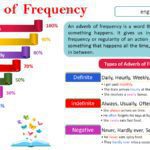
Adverbs of Frequency with Types and Examples
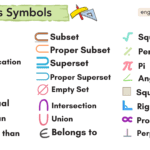
Symbols of Maths with Name in English
Copyright © 2024 by englishan
Username or Email Address
Remember Me
Forgot password?
Enter your account data and we will send you a link to reset your password.
Your password reset link appears to be invalid or expired.
Privacy policy.
To use social login you have to agree with the storage and handling of your data by this website. %privacy_policy%
Add to Collection
Public collection title
Private collection title
No Collections
Here you'll find all collections you've created before.
Linking Words in English: Adding, Organizing, Summarizing
Adding information and examples.
for example / for instance
Use these words to give one example of the idea you are talking about. Both of these expressions can go at the beginning or the end of a sentence.
- There are a number of problems in this school. For example, many of the classrooms don’t have audiovisual equipment.
- She has a lot of good ideas for our business – opening an online store, for instance.
Written English: i.e. and e.g
In written English, we can use i.e. to give further explanation or clarification; it means “that is” or “in other words.”
- Our last marketing campaign failed ( i.e. we spent $50,000 and didn’t make many sales).
- I enjoy radical sports ( e.g. rock climbing, hang gliding, and windsurfing).
namely / such as
There is a difference between namely and such as .
Namely is followed by ALL of the examples you referred to, but such as gives only one or some of the examples, not all of them.
- A few of the students – namely Brian, Thomas, and Jack – failed the course.
- A few of the students, such as Brian, failed the course.
Also can go in the middle of a sentence, whereas too is typically used at the end.
- We did a lot of sightseeing on our vacation. We also bought a number of souvenirs.
- We did a lot of sightseeing on our vacation. We bought a number of souvenirs, too.
as well / as well as
As well goes at the end of the sentence (similarly to too).
As well as must be followed by another word.
- She’s not only extremely successful, she’s beautiful as well.
- She’s beautiful as well as being extremely successful.
in addition / moreover / furthermore
These linking words are usually used at the beginning of a sentence to add another idea or further develop the previous point.
- People who exercise regularly have more energy during the day and sleep better at night. In addition, they tend to live longer.
- Construction on the new subway has been delayed for months due to budget shortfalls. Moreover, the workers are threatening to go on strike.
- Our sales are expected to rise 30% in the next year. Furthermore, purchase of new equipment will help cut manufacturing costs and increase profits.
- what’s more
Organizing and Ordering Information
Firstly / Secondly
When you are going to make a series of points, you can use firstly and secondly for the first and second points. After that, you can use “The third point,” “The fourth point,” etc. or “in addition.”
Lastly / Finally
For your final point, you can begin the sentence with lastly or finally. These words show your audience that you are almost finished.
the former / the latter
You can use these words to refer back to two examples previously mentioned:
- Our company has two factories: one in Detroit and one in Atlanta. The former is operating at 95% capacity and the latter at 65%.
Summarizing Information
Here are some English phrases you can use to give a summary of the information you have already said or written. In general, these phrases go at the beginning of the sentence and are followed by a comma.
- To summarize
- In conclusion
- In a nutshell (more informal)
Learn more: Linking verbs
Master the details of English grammar:

More Espresso English Lessons:
About the author.
Shayna Oliveira
Shayna Oliveira is the founder of Espresso English, where you can improve your English fast - even if you don’t have much time to study. Millions of students are learning English from her clear, friendly, and practical lessons! Shayna is a CELTA-certified teacher with 10+ years of experience helping English learners become more fluent in her English courses.
- Skip to main content
- Skip to secondary menu
- Skip to primary sidebar
Your English Web
English learning videos
Essay linking Words in English
By Admin Leave a Comment
Essay Linking Words
If you are studying for an English exam like First Certificate, Advanced or Proficiency, you will need to Essay Linking Words .
We use linking words to join sentences together when we write and speak English.
They are also important to write cohesive sentences and paragraphs.
In this English lesson we look at linking words for Time, Reason, Result, Purpose .
Let’s look at the four different types of linking words individually with some examples.
when, after, while, once, since, ever since, as soon as
- I had a bath while the children watched television.
- I have not been happy ever since I lost my job.
- I will come to visit you as soon as I can.
- Jenny has been different since her divorce.
because, since, As, in case, in so far as
- Since you are going to drink tonight, let’s take a taxi.
- Let’s have a picnic today in case it rains tomorrow.
- Wikipedia is great in so far as it helps you learn new things.
- We couldn’t get out much today as it was raining.
so (that), such (that), therefore, as a result
- We got to the cinema late so we missed the start of the film.
- It was such a hot day that the air conditioning didn’t work properly.
- I lost my job as a result of the crisis.
in order to, so as to, in order that, so that
- He spoke slowly in order to make himself understood.
- I will try to speak slowly so that you can understand me better.
- Please walk quietly so as to avoid waking the baby.
Remember that the sooner you start to use these words in your sentences the better your English will become.
Don’t be afraid to make mistakes as it is one of the best ways to learn.
Want to learn more about essay linking words and connectors? Click here .
Many of my lessons are on Curious.com . Check them out.
Please share the lesson with you friends.
If you liked the lesson you can buy me breakfast . This will help me to make more lessons for you to learn English for free.
Reader Interactions
Leave a reply cancel reply.
Your email address will not be published. Required fields are marked *
What is the sum of 2 and 7? (Required)
Leave the field below empty!
Places on our 2024 summer school are filling fast. Don’t miss out. Enrol now to avoid disappointment
- 40 Useful Words and Phrases for Top-Notch Essays

To be truly brilliant, an essay needs to utilise the right language. You could make a great point, but if it’s not intelligently articulated, you almost needn’t have bothered.
Developing the language skills to build an argument and to write persuasively is crucial if you’re to write outstanding essays every time. In this article, we’re going to equip you with the words and phrases you need to write a top-notch essay, along with examples of how to utilise them.
It’s by no means an exhaustive list, and there will often be other ways of using the words and phrases we describe that we won’t have room to include, but there should be more than enough below to help you make an instant improvement to your essay-writing skills.
If you’re interested in developing your language and persuasive skills, Oxford Royale offers summer courses at its Oxford Summer School , Cambridge Summer School , London Summer School , San Francisco Summer School and Yale Summer School . You can study courses to learn english , prepare for careers in law , medicine , business , engineering and leadership.
General explaining
Let’s start by looking at language for general explanations of complex points.
1. In order to
Usage: “In order to” can be used to introduce an explanation for the purpose of an argument. Example: “In order to understand X, we need first to understand Y.”
2. In other words
Usage: Use “in other words” when you want to express something in a different way (more simply), to make it easier to understand, or to emphasise or expand on a point. Example: “Frogs are amphibians. In other words, they live on the land and in the water.”
3. To put it another way
Usage: This phrase is another way of saying “in other words”, and can be used in particularly complex points, when you feel that an alternative way of wording a problem may help the reader achieve a better understanding of its significance. Example: “Plants rely on photosynthesis. To put it another way, they will die without the sun.”
4. That is to say
Usage: “That is” and “that is to say” can be used to add further detail to your explanation, or to be more precise. Example: “Whales are mammals. That is to say, they must breathe air.”
5. To that end
Usage: Use “to that end” or “to this end” in a similar way to “in order to” or “so”. Example: “Zoologists have long sought to understand how animals communicate with each other. To that end, a new study has been launched that looks at elephant sounds and their possible meanings.”
Adding additional information to support a point
Students often make the mistake of using synonyms of “and” each time they want to add further information in support of a point they’re making, or to build an argument . Here are some cleverer ways of doing this.
6. Moreover
Usage: Employ “moreover” at the start of a sentence to add extra information in support of a point you’re making. Example: “Moreover, the results of a recent piece of research provide compelling evidence in support of…”
7. Furthermore
Usage:This is also generally used at the start of a sentence, to add extra information. Example: “Furthermore, there is evidence to suggest that…”
8. What’s more
Usage: This is used in the same way as “moreover” and “furthermore”. Example: “What’s more, this isn’t the only evidence that supports this hypothesis.”
9. Likewise
Usage: Use “likewise” when you want to talk about something that agrees with what you’ve just mentioned. Example: “Scholar A believes X. Likewise, Scholar B argues compellingly in favour of this point of view.”
10. Similarly
Usage: Use “similarly” in the same way as “likewise”. Example: “Audiences at the time reacted with shock to Beethoven’s new work, because it was very different to what they were used to. Similarly, we have a tendency to react with surprise to the unfamiliar.”
11. Another key thing to remember
Usage: Use the phrase “another key point to remember” or “another key fact to remember” to introduce additional facts without using the word “also”. Example: “As a Romantic, Blake was a proponent of a closer relationship between humans and nature. Another key point to remember is that Blake was writing during the Industrial Revolution, which had a major impact on the world around him.”
12. As well as
Usage: Use “as well as” instead of “also” or “and”. Example: “Scholar A argued that this was due to X, as well as Y.”
13. Not only… but also
Usage: This wording is used to add an extra piece of information, often something that’s in some way more surprising or unexpected than the first piece of information. Example: “Not only did Edmund Hillary have the honour of being the first to reach the summit of Everest, but he was also appointed Knight Commander of the Order of the British Empire.”
14. Coupled with
Usage: Used when considering two or more arguments at a time. Example: “Coupled with the literary evidence, the statistics paint a compelling view of…”
15. Firstly, secondly, thirdly…
Usage: This can be used to structure an argument, presenting facts clearly one after the other. Example: “There are many points in support of this view. Firstly, X. Secondly, Y. And thirdly, Z.
16. Not to mention/to say nothing of
Usage: “Not to mention” and “to say nothing of” can be used to add extra information with a bit of emphasis. Example: “The war caused unprecedented suffering to millions of people, not to mention its impact on the country’s economy.”
Words and phrases for demonstrating contrast
When you’re developing an argument, you will often need to present contrasting or opposing opinions or evidence – “it could show this, but it could also show this”, or “X says this, but Y disagrees”. This section covers words you can use instead of the “but” in these examples, to make your writing sound more intelligent and interesting.
17. However
Usage: Use “however” to introduce a point that disagrees with what you’ve just said. Example: “Scholar A thinks this. However, Scholar B reached a different conclusion.”
18. On the other hand
Usage: Usage of this phrase includes introducing a contrasting interpretation of the same piece of evidence, a different piece of evidence that suggests something else, or an opposing opinion. Example: “The historical evidence appears to suggest a clear-cut situation. On the other hand, the archaeological evidence presents a somewhat less straightforward picture of what happened that day.”
19. Having said that
Usage: Used in a similar manner to “on the other hand” or “but”. Example: “The historians are unanimous in telling us X, an agreement that suggests that this version of events must be an accurate account. Having said that, the archaeology tells a different story.”
20. By contrast/in comparison
Usage: Use “by contrast” or “in comparison” when you’re comparing and contrasting pieces of evidence. Example: “Scholar A’s opinion, then, is based on insufficient evidence. By contrast, Scholar B’s opinion seems more plausible.”
21. Then again
Usage: Use this to cast doubt on an assertion. Example: “Writer A asserts that this was the reason for what happened. Then again, it’s possible that he was being paid to say this.”
22. That said
Usage: This is used in the same way as “then again”. Example: “The evidence ostensibly appears to point to this conclusion. That said, much of the evidence is unreliable at best.”
Usage: Use this when you want to introduce a contrasting idea. Example: “Much of scholarship has focused on this evidence. Yet not everyone agrees that this is the most important aspect of the situation.”
Adding a proviso or acknowledging reservations
Sometimes, you may need to acknowledge a shortfalling in a piece of evidence, or add a proviso. Here are some ways of doing so.
24. Despite this
Usage: Use “despite this” or “in spite of this” when you want to outline a point that stands regardless of a shortfalling in the evidence. Example: “The sample size was small, but the results were important despite this.”
25. With this in mind
Usage: Use this when you want your reader to consider a point in the knowledge of something else. Example: “We’ve seen that the methods used in the 19th century study did not always live up to the rigorous standards expected in scientific research today, which makes it difficult to draw definite conclusions. With this in mind, let’s look at a more recent study to see how the results compare.”
26. Provided that
Usage: This means “on condition that”. You can also say “providing that” or just “providing” to mean the same thing. Example: “We may use this as evidence to support our argument, provided that we bear in mind the limitations of the methods used to obtain it.”
27. In view of/in light of
Usage: These phrases are used when something has shed light on something else. Example: “In light of the evidence from the 2013 study, we have a better understanding of…”
28. Nonetheless
Usage: This is similar to “despite this”. Example: “The study had its limitations, but it was nonetheless groundbreaking for its day.”
29. Nevertheless
Usage: This is the same as “nonetheless”. Example: “The study was flawed, but it was important nevertheless.”
30. Notwithstanding
Usage: This is another way of saying “nonetheless”. Example: “Notwithstanding the limitations of the methodology used, it was an important study in the development of how we view the workings of the human mind.”
Giving examples
Good essays always back up points with examples, but it’s going to get boring if you use the expression “for example” every time. Here are a couple of other ways of saying the same thing.
31. For instance
Example: “Some birds migrate to avoid harsher winter climates. Swallows, for instance, leave the UK in early winter and fly south…”
32. To give an illustration
Example: “To give an illustration of what I mean, let’s look at the case of…”
Signifying importance
When you want to demonstrate that a point is particularly important, there are several ways of highlighting it as such.
33. Significantly
Usage: Used to introduce a point that is loaded with meaning that might not be immediately apparent. Example: “Significantly, Tacitus omits to tell us the kind of gossip prevalent in Suetonius’ accounts of the same period.”
34. Notably
Usage: This can be used to mean “significantly” (as above), and it can also be used interchangeably with “in particular” (the example below demonstrates the first of these ways of using it). Example: “Actual figures are notably absent from Scholar A’s analysis.”
35. Importantly
Usage: Use “importantly” interchangeably with “significantly”. Example: “Importantly, Scholar A was being employed by X when he wrote this work, and was presumably therefore under pressure to portray the situation more favourably than he perhaps might otherwise have done.”
Summarising
You’ve almost made it to the end of the essay, but your work isn’t over yet. You need to end by wrapping up everything you’ve talked about, showing that you’ve considered the arguments on both sides and reached the most likely conclusion. Here are some words and phrases to help you.
36. In conclusion
Usage: Typically used to introduce the concluding paragraph or sentence of an essay, summarising what you’ve discussed in a broad overview. Example: “In conclusion, the evidence points almost exclusively to Argument A.”
37. Above all
Usage: Used to signify what you believe to be the most significant point, and the main takeaway from the essay. Example: “Above all, it seems pertinent to remember that…”
38. Persuasive
Usage: This is a useful word to use when summarising which argument you find most convincing. Example: “Scholar A’s point – that Constanze Mozart was motivated by financial gain – seems to me to be the most persuasive argument for her actions following Mozart’s death.”
39. Compelling
Usage: Use in the same way as “persuasive” above. Example: “The most compelling argument is presented by Scholar A.”
40. All things considered
Usage: This means “taking everything into account”. Example: “All things considered, it seems reasonable to assume that…”
How many of these words and phrases will you get into your next essay? And are any of your favourite essay terms missing from our list? Let us know in the comments below, or get in touch here to find out more about courses that can help you with your essays.
At Oxford Royale Academy, we offer a number of summer school courses for young people who are keen to improve their essay writing skills. Click here to apply for one of our courses today, including law , business , medicine and engineering .
Comments are closed.
- Have your assignments done by seasoned writers. 24/7
- Contact us:
- +1 (213) 221-0069
- [email protected]

Linking Words for Essay Writing: Useful Paragraph Phrases
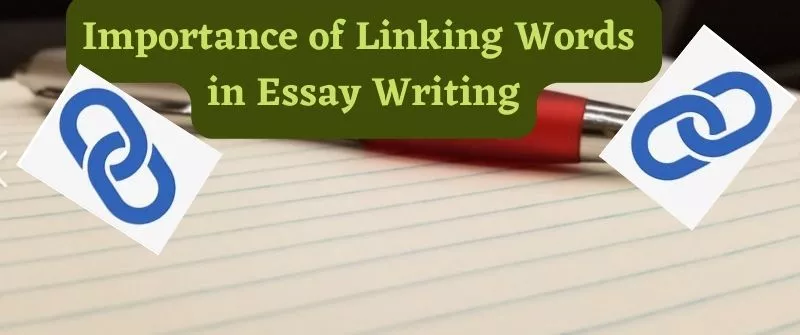
Importance of Linking Words in Essay Writing
An essay is an important piece of writing when a student is seeking college admission. It needs to have a clear flow so that the readability is perfect. Rightly so, the sentences you construct need to flow and lead to each other seamlessly.
Linking or transition words come in handy to make your essay have comprehensible sentences. The words act as the ideal connectors and bridges that eliminate sentence isolation.

Factually, both writing and speaking need linking words that will help the audience form a clear relationship between ideas. Listeners and readers are able to comprehend responses when the right linking words are in place.
What are Linking Words in Essay Writing?
Linking words are the uniformity basis of an essay. When these words are in an essay, they showcase a connection between sentences. As usual, a typical essay consists of different sections and paragraphs.
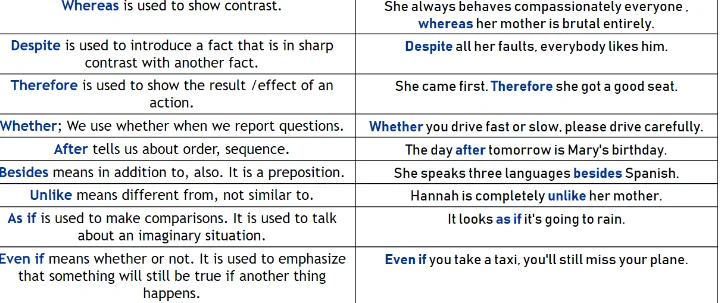
If there are no transition words, the sentences will appear incoherent and messy. The use of linking words clearly show the relationship existing between all sections and paragraphs in an essay.
When writing your essay, make use of linking words as a bridge between the concepts you are writing and ideas in your essay. The readers will enjoy a cohesive piece of essay with texts that are flowing smoothly.
The assessment team has a lot of essays to read and you can make their work easy by using your linking words appropriately. If this is not the case, your professor will have to go through a lot of stress in trying to understand your essay.
Basically, if you want to impress your readers and consequently improve your scores, practice the best linking words skills.
People Also Read: A Guide for Buying a College Essay: Without Being Caught
Reasons for Using Linking Words in Essay Writing
Only proper usage of linking words will help you come up with a compelling essay. After toiling to conduct research for your essay, improper structure of sentences will make your efforts go to waste.
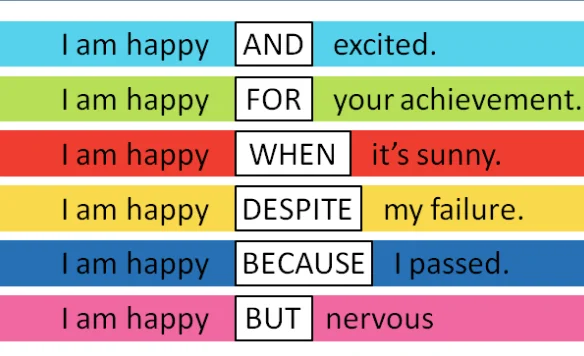
Good students endeavor and strive to create an appealing and expressive essay. A thorough use of the right linking words will make your presentation and persuasion of ideas flow perfectly.
Linking words are very crucial in any type of essay . If you do not want your texts to appear clucky, transition words ought to be in place.
Here are more reasons why you need linking words in your essay:
1. Flow of Order and Sequence
An essay needs flow of texts, ideas and thoughts otherwise it will lose its quality. Therefore, writers need to make huge efforts and use the right linking words that will bring a sequence of order in the essay.
Such words include next, then, firstly, secondly, afterwards, finally and afterwards. Other transition words to use include concurrently, at the same time, earlier, first of all, following this and for now.
A good sequence order in your essay is also enhanced when you use words such as lastly, in the end, in the beginning or once upon a time.
2. Showcasing Comparison
There are essays that will require the writer to show comparison. Linking words play an important role in contrast and argumentative essays .
If you need to bring out comparison clearly, consider the use of words such as similarly, equally, comparable, in the same time and likewise.
Apart from same as, other words or phrases to use include just like, just as and comparably.
3. Contrasting
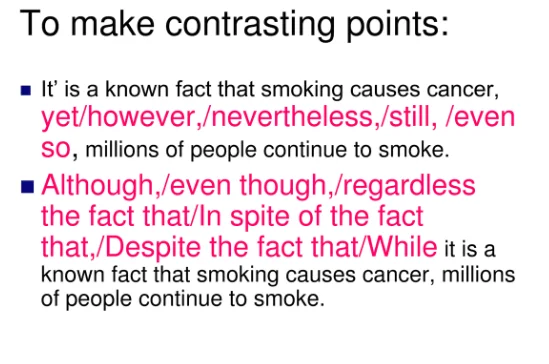
Transition words are the best when you want to bring out contrast in a sentence. In most of the cases, place then at the beginning or in the middle of your sentence to create the right contrast.
However, despite this, yet, whereas and alternatively are some of the words you can use.
4. Illustration of Examples
There are places in your essay where you will have to give examples. Obviously, most essays will need illustration of evidence with the use of linking words.
Giving examples without these words will make your text to sound blunt.
Linking words such as for instance, in the case of, and for instance will make it easy to introduce your examples.
5. Including Additions
You will also need to use linking words when putting additions in your essays. These words will ensure that you have added a txt with the correct meaning to your essay.
Furthermore, also, secondly, in addition and moreover are some of the linking words to use.
6. Introduction of Cause and Effects
Cause and effects in an essay can help the writer draw a sensible conclusion. In essence, it helps to bring about good connection of the essay when a conclusion is being added. Therefore, the relationship between cause and effect is better shown using the right linking words.
Owing to, thus, since, as a result of and because are some of the transition words you can use. Other words to use include stems from, leads to, results from, for this reason etc.
7. For Conclusion Purposes
Starting an impressive essay can only be better if the conclusion is attractive. It is good to bring about the conclusion using appropriate linking words that are not common.
You can conclude your essay using words such as finally, in conclusion, summarizing, in summary and briefly.
As a writer, you need to bear in mind that adjusting and positioning these words is a must if you are to impress your readers.
People Also Read: SAT Essay Cancellation: Before College Registration Process
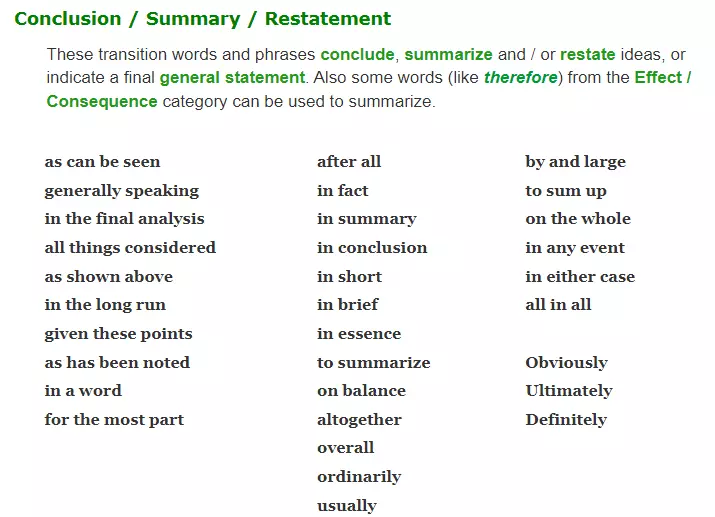
Dos of Using Linking Words
- Adjust and position your linking words properly otherwise the reader will not be impressed.
- Do mix up the linking words you use. Using one word several times can be very annoying to the reader. Since the transition phrases are many, mix them up in your essay to avoid repetition.
- Be accurate in using these words when connecting your ideas in an essay. Know the difference between these phrases to understand the meaning correctly.
- You can use these words when you want to accentuate a point. In other words, use them to stress something important in your writing.
30 Examples of Linking Words for Essay Writing
- On the flipside
- On the contrary
- By and large
- As a consequence of
- In conclusion
- Following this
- At this point of time
- In the same way
- As an example
- In other words
- To put it differently
- Under the circumstances
- That is to say
- With this intention
- Subsequently
- In order to
- Of less importance
- What’s more
- Furthermore
- Alternatively
- In spite of
- To illustrate
- To demonstrate
- In the middle of
- For the avoidance of doubt
People Also Read: How to write an Informal Essay: All you need to know
Wrapping Up on Linking words on Essay Writing
You can’t overlook the significance of linking words in essay writing. Transition words are important in bringing ideas together so that they appear as a whole in your essay.
All in all, an essay that flows well must incorporate the right transition words to link arguments and actions. The readers will be able to connect an event that took place because of a consequence of a different action.
Essays need to have a flow of ideas with each one building on the other. Yet still, organization of thoughts in essay writing is valuable and this is where linking words play a critical role.
To sum it up, the more your thoughts are in good organization, the smoother your essay will flow. When you use linking words appropriately, your piece will have a logical structure that is appealing to the reader.

When not handling complex essays and academic writing tasks, Josh is busy advising students on how to pass assignments. In spare time, he loves playing football or walking with his dog around the park.
Related posts
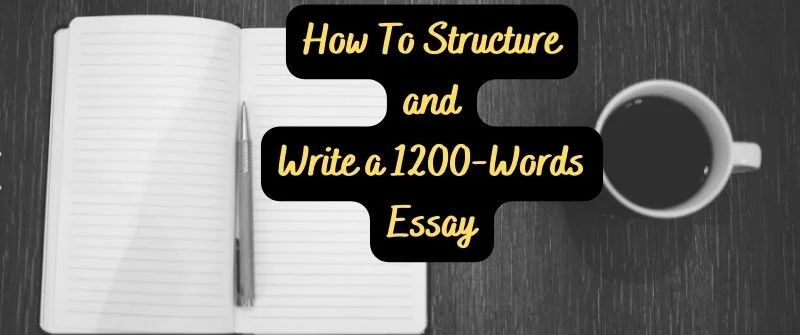
writing 1200 Words Essay
1200 Words Essay: How Many Pages, How to Write& It’s Structure
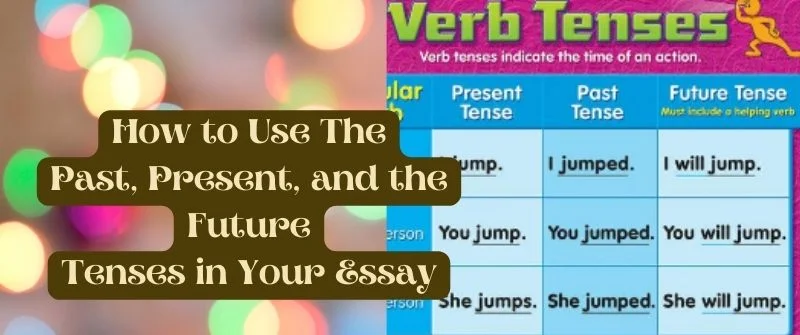
Past, Present, and the Future Tenses in Your Essay
Past, Present, and Future Tense in Essays: How to Switch

Can-a-Plagiarism-Scanner-Detect-AI-written-Paper
Can Plagiarism checkers detect AI Text like Jervis? Turnitin or SafeAssign
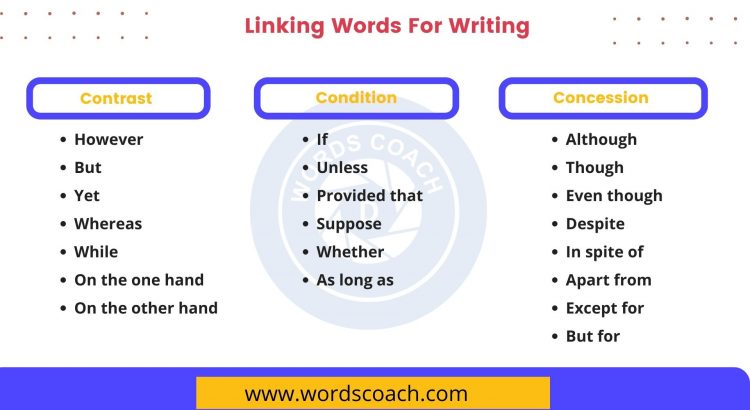
Linking Words For Writing English Essay
Transitions link one main idea to another separated by a semi-colon or full-stop. When the transition word is at the beginning of the sentence, It should be followed by a comma.
- On the one hand
- On the other hand
Emphasizing
- As a matter of fact
- Provided that
- Even though
- In spite of
Reformulating
- That is to say
- In other words
- To put things differently
- In my opinion
- As far as I’m concern
- It seems to me that…
Consequence
- As a result
- As a consequence
- Consequently
Adding ideas
- Furthermore
- In addition
- Not only … but also
- All things considered
- In a nutshell
- Neither … nor
- Either … or
Explaining Cause
- In so for as
- The reason why
- In order to

Related Posts:
- List of 100+ Useful Contrast Transition Words with Meaning…
- What is a Comma (,) and When to Use It: Important Comma…
- List of 25+ Useful Contrast Transition Words for Writing…
- 10 Types of Various Punctuation Marks and Know the Usage of…
- Conditional Sentences in English
- Subordinating Conjunctions and Example Sentences in English
- Emphasizing Adjective
- Phrases by Category
Leave a Reply Cancel reply
Your email address will not be published. Required fields are marked *
Save my name, email, and website in this browser for the next time I comment.
Download the Word coach App on your Android phone
Word Coach - IELTS and GRE Vocabulary Builder & word coach Quiz (10 Words a Day) application helps, you and your friends to improve English Vocabulary and help you become the smartest among your group.


- Part Time Courses
- General English
- English Electives
- Online Courses
- Tests and Preparation Courses
- Bespoke Group Courses
- University College Pathway Halifax
- Academic Support
- Social Programme
- Accommodation
- Student Welfare
- Virtual Learning Campus
- Pathways Programs
- Download a Brochure
- English Test
- Visa Information
- Virtual Classroom FAQs
- Prices & Payment
- School Policies
- Public Holidays and Term Dates
- Handbooks & Forms
- Inspection Reports
- Covid-19 Information (North America)
- Contact us now
Linking Words & Phrases In English
Connecting words and phrases in the English language is one area you will need to master, as you are learning the language. The English language is difficult, but hopefully, this short article will help you understand how to use linking words and phrases correctly.
When Would You Need to Connect Words and Phrases in English?
Words and phrases need to be connected for a variety of reasons. For example, you may want to make a comparison, contrast, show purpose or demonstrate condition. Most of the connectives, words that form the connection, are used to join two clauses together or start a new sentence expanding on the previous statement.
Linking Clauses Within A Sentence
The words included here are used when you want to join two parts of the sentence together.
Although/even though
- Although she is old, she can still run far.
- She is pretty and single, but even if she wasn’t pretty, she would still be single.
- You might want to take flat shoes; in case you want to dance later.
In spite of/despite
- In spite of/despite the fact she was busy, she still made time to volunteer.
- He took a large umbrella so that if it rained, he wouldn’t get wet.
- You can rely on me whatever happens.
- Samantha has a dog, whereas Billy does not.
- I would lend money to you whenever you need it.
- I will still care for you wherever you go.
Above are different word choices you may use when you are linking two parts (or clauses) of a sentence. This list is by no means extensive and you may find other connectives that fit your subject better. These are just a few examples to show you some different connectives and how they can be used within a sentence.
Linking Two Separate Sentences
The linking words and phrases included here are used when you want to link two complete sentences together. Remember, if a connective word starts the sentence it should be followed by a comma. The words in this section will be grouped, as they can often be used in place of one another.
As a result/Consequently/Furthermore
- The company is growing. Consequently, there will be more jobs on offer.
Besides/Furthermore/In addition/More over
- The holiday is too expensive. Besides, I don’t really want to go.
However/Nevertheless/Nonetheless
- The shop was open. However, nobody came to the kiosk.
In the same way/ Likewise/ Similarly
- I believe that teenagers are respectful. Similarly, research has shown this.
The above words can be used if you are linking two separate sentences together. As stated before, the list is not exhaustive. However, this should give you a good idea of the connectives out there and the way to use them to join two sentences.
The English language is tricky to learn and connecting words (or connectives) are part of that. Hopefully, there are enough examples of linking words and phrases included here to get you started. You may even be able to add more to the list yourself.

Here or Hear? What’s the Difference and When to Use Them

A brief history of the English language

British slang words & phrases
Privacy overview.

IMAGES
VIDEO
COMMENTS
Worried that your essay lacks structure and coherence? Perhaps you should use linking words, transition words, or connectors to give it a boost. Linking words join separate sentences to improve writing flow. You can also find them mid-sentence to connect clauses. Read on as I show you the definition and types of linking words in English.
50 linking words to use in academic writing. academic writing. linkers. essay writing. thesis. ESL. English. It's very common for students to use long words they don't understand very well in their essays and theses because they have a certain idea of what academic writing should be.
Without linking words, your writing can feel disjointed and confusing. Some common examples of linking words include "however," "therefore," "in addition," "moreover," "nevertheless," and "consequently.". These words can be used to show contrast, add information, provide examples, or indicate a cause and effect ...
Words and phrases connected with sequencing and structure appear at the start of a sentence. Examples include: first, secondly, finally and in conclusion. Adverbs, which express the writer's opinion, also occur at the start of a sentence, for example evidently and obviously. Linking words can be used between clauses, in the middle of the ...
While transition words are essential to clear writing, it's possible to use too many of them. Consider the following example, in which the overuse of linking words slows down the text and makes it feel repetitive. The first experiment yielded a positive result. However, the second experiment yielded a negative result.
Linking/Transition Words. Transitions link one main idea to another separated by a semi-colon or full-stop. When the transition word is at the beginning of the sentence, it should be followed by a comma: Among other functions, they can signal cause and effect or sequencing (see examples in the table below). Additional comments or ideas.
Linking words play an important role in academic writing: They connect different paragraphs, sections or ideas in a text. Therefore, they considerably improve the readability and argumentation of academic texts such as a thesis, dissertation, essay or journal publication. This list of 75 linking words includes examples of how they can be used in academic
Sharing is caring! Linking words and phrases are used to show relationships between ideas. They can be used to join two or more sentences or clauses. We can use linking words to give a result, add information, summarize, give illustrations, emphasize a point, sequence information, compare or to contrast idea.
These words simply add additional information to your sentence or paragraph to show that two ideas are similar. Here are some examples: It started to rain and I got soaked - 'and' is the linking word that connects the two ideas of the individual being in the rain and getting soaked. It can't be the dog's fault nor the cat's ...
Useful Linking Words for Writing Essays in English. Last updated: July 20, 2019. 7 Comments. Sharing is caring! Linking Words ! This page provides a list of useful linking words for writing essays in English for ESL learners. Linking Words. ADDITION.
In short, they connect ideas together. We use them in both writing and speaking, but they are most important in writing because they provide structure to your paragraphs. Linking words can connect two parts of one sentence. They go at the beginning of a sentence or in between the two parts: Example 1: Although it was summer, George was wearing ...
Types of Linking Words. Linking words can be the linking words of ideas, conclusion, contrast, likes, dislike, summary, consequence, examples, reason, effects, comparison, emphasis, and results. We know that English is a very tricky language, and you must be confused about how to use different linking words in different types of sentences or ...
Essays commonly use linking words in the following places: The beginning of a paragraph. Beginning of a statement that expands on an argument or presents something new. At the start of a concluding statement. However, you need to use the right to link it from one another sentences or paragraphs.
Linking words are used to introduce, connect and join together information. These words are essential and are used in a variety of ways to help the flow of ideas. There is often a list of linking words to help write an essay or report in English. Well-written essays often contain a collection of topic sentences, linking words and supporting ...
Linking words at different levels. Let's use Cambridge writing scales as a guide for what we should be using at different levels. At B1 Preliminary (PET) candidates are expected to use basic linking words. Basic linking words are essentially and, so, but and because. At B2 First (FCE) level, a variety of linking words should be used.
Linking words make it easier for readers to understand the flow of information and how one idea leads to another. Linking words can be used to indicate contrast, similarity, cause and effect, time, addition, conclusion, and more. Examples of linking words include "and," "but," "because," "however," "also," "for example ...
in addition / moreover / furthermore. These linking words are usually used at the beginning of a sentence to add another idea or further develop the previous point. People who exercise regularly have more energy during the day and sleep better at night. In addition, they tend to live longer.
We use linking words to join sentences together when we write and speak English. They are also important to write cohesive sentences and paragraphs. In this English lesson we look at linking words for Time, Reason, Result, Purpose. Let's look at the four different types of linking words individually with some examples. when, after, while ...
4. That is to say. Usage: "That is" and "that is to say" can be used to add further detail to your explanation, or to be more precise. Example: "Whales are mammals. That is to say, they must breathe air.". 5. To that end. Usage: Use "to that end" or "to this end" in a similar way to "in order to" or "so".
Linking words play an important role in contrast and argumentative essays. If you need to bring out comparison clearly, consider the use of words such as similarly, equally, comparable, in the same time and likewise. Apart from same as, other words or phrases to use include just like, just as and comparably. 3.
Transitions link one main idea to another separated by a semi-colon or full-stop. When the transition word is at the beginning of the sentence, It should be followed by a comma. Linking Words For Writing English Essay. Contrast. However; But; Yet; Whereas; While; On the one hand; On the other hand
Linking Two Separate Sentences. The linking words and phrases included here are used when you want to link two complete sentences together. Remember, if a connective word starts the sentence it should be followed by a comma. The words in this section will be grouped, as they can often be used in place of one another. As a result/Consequently ...